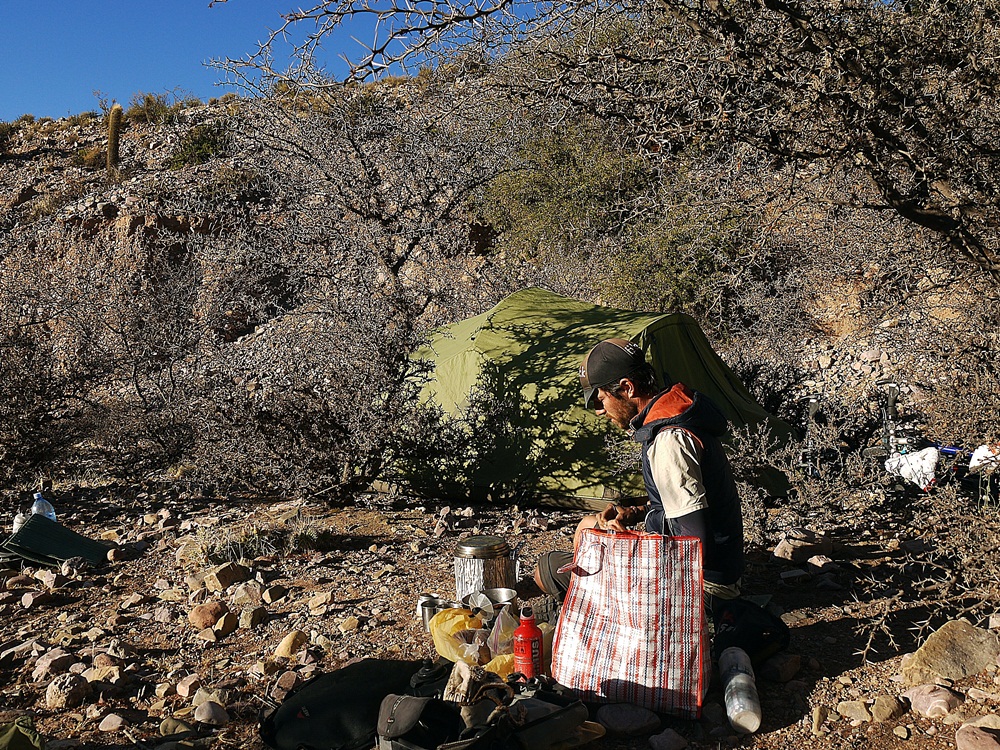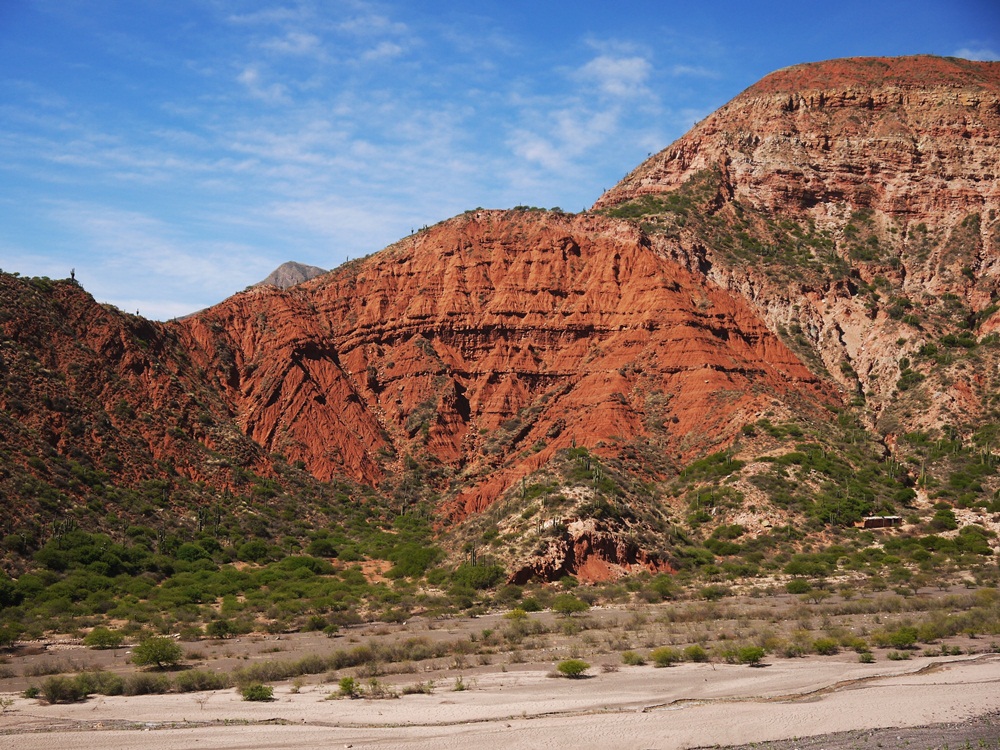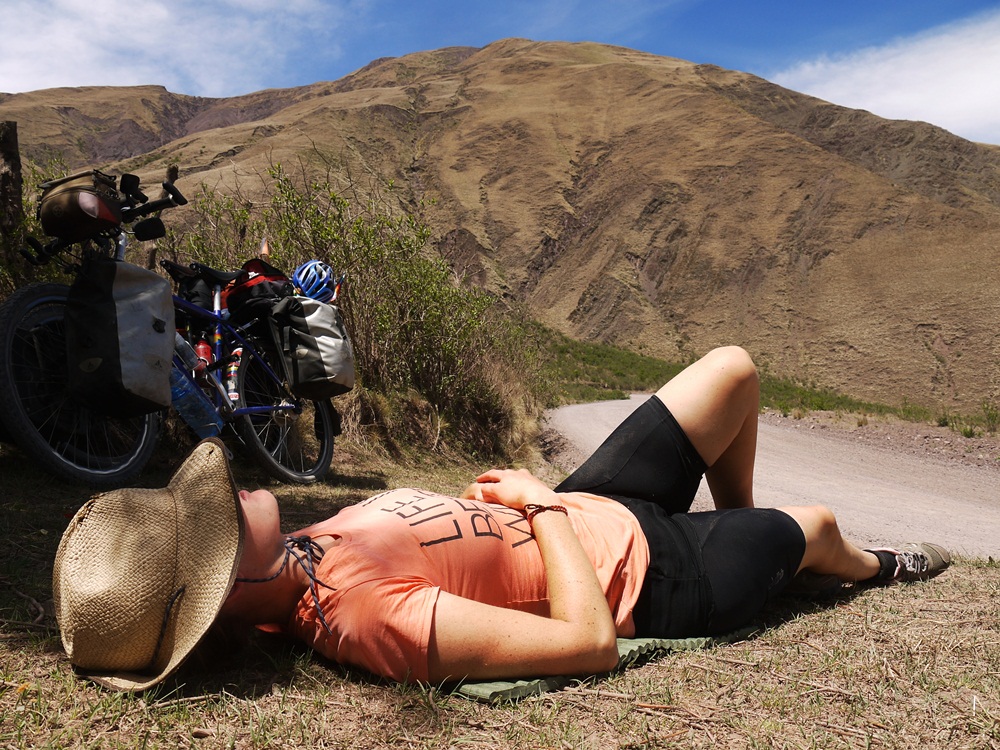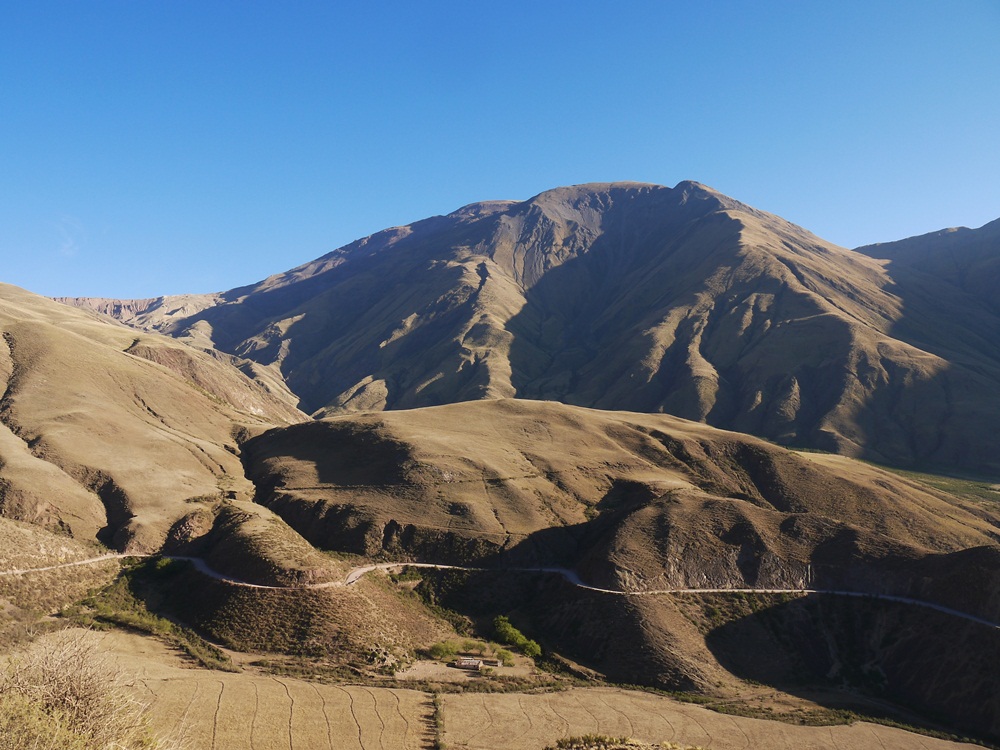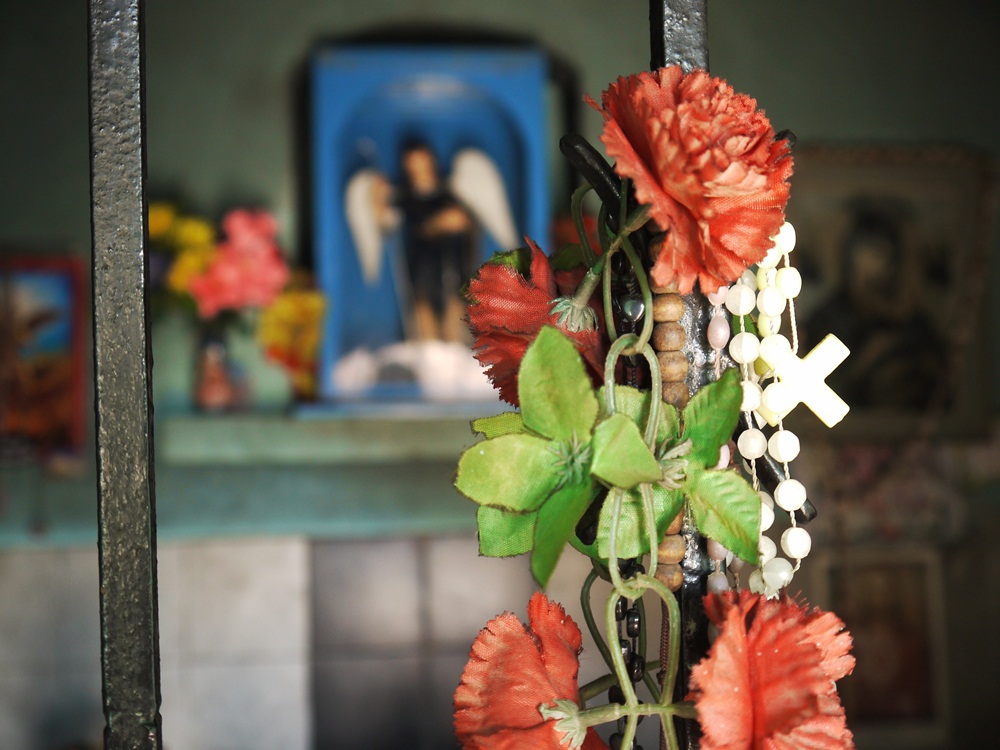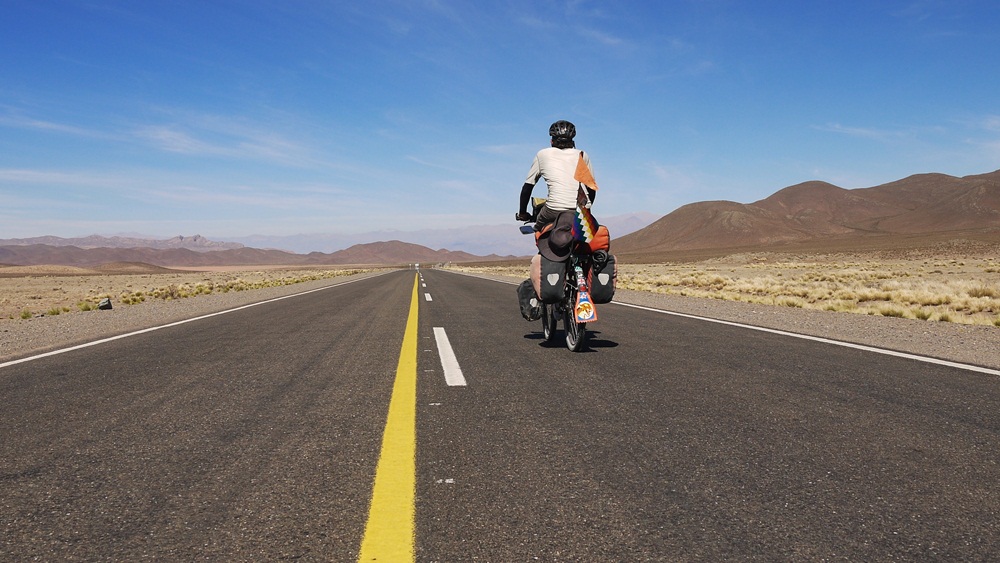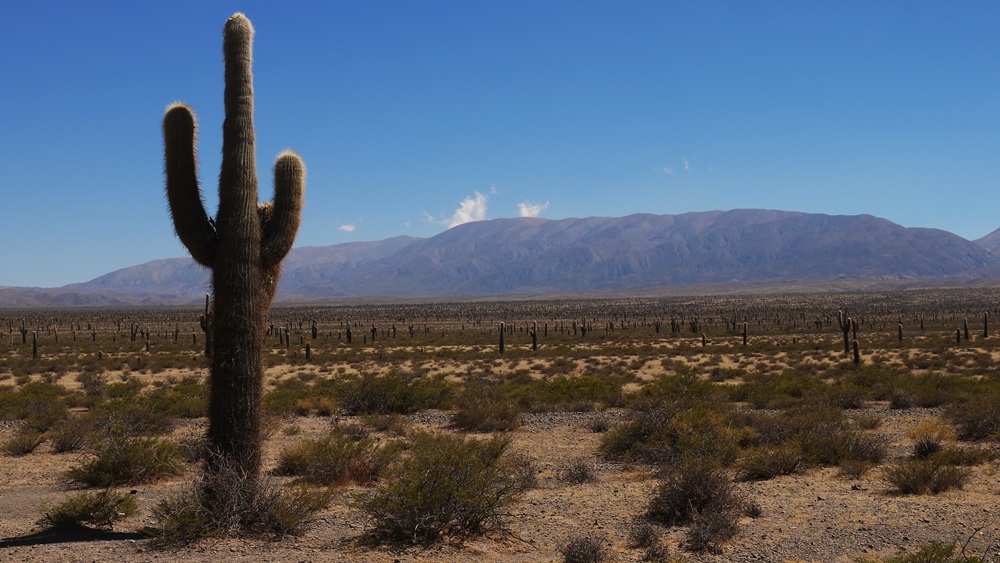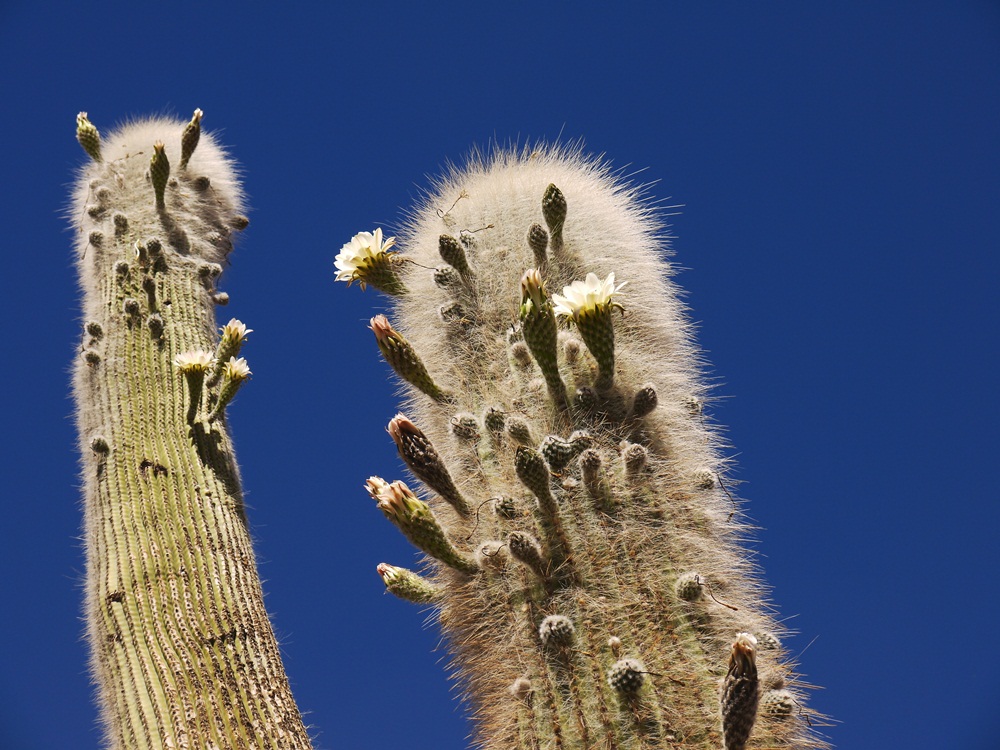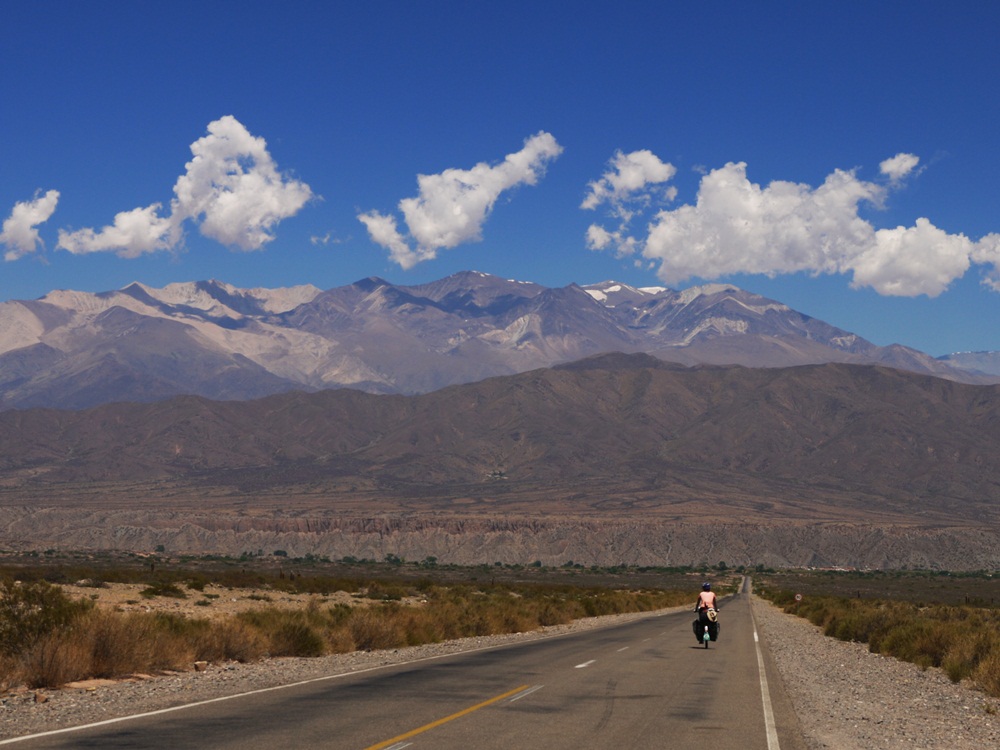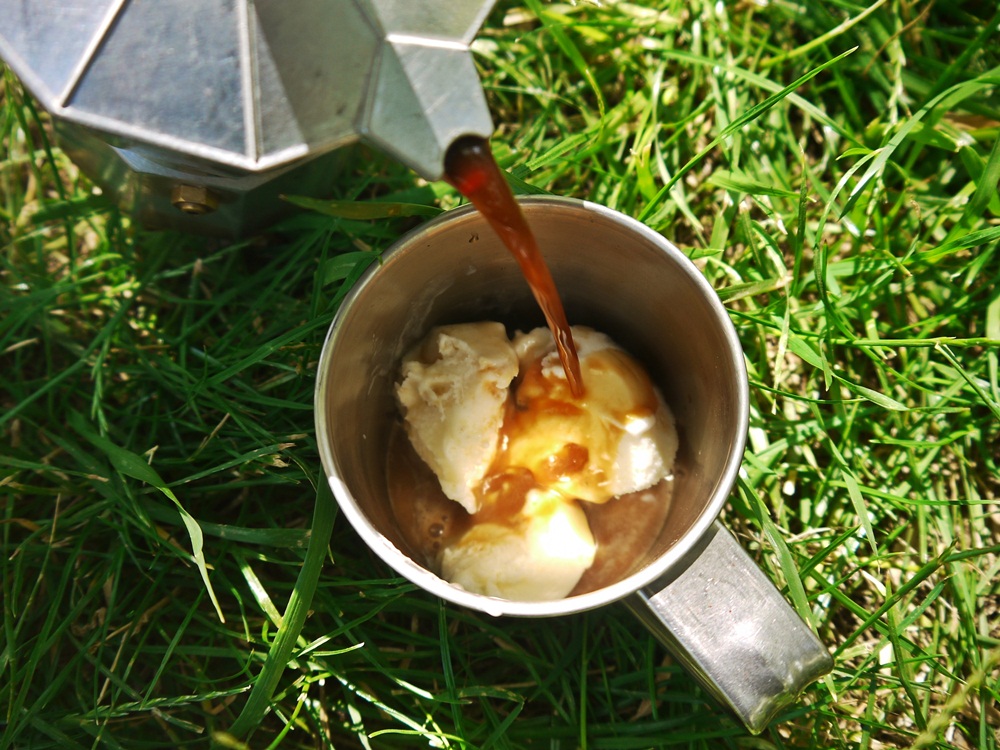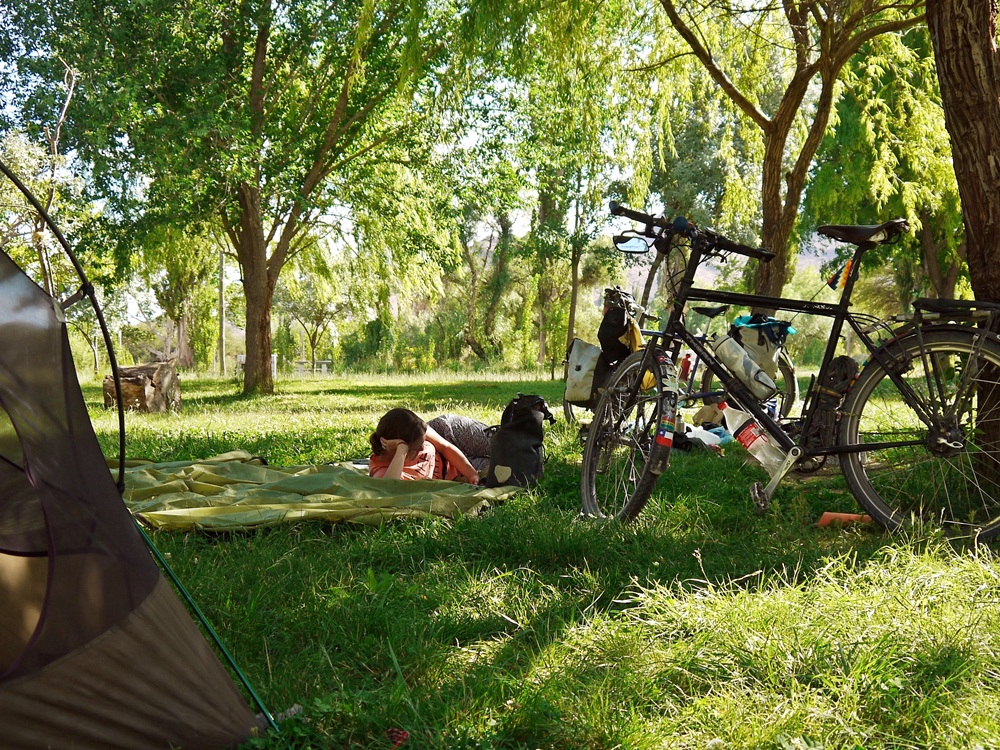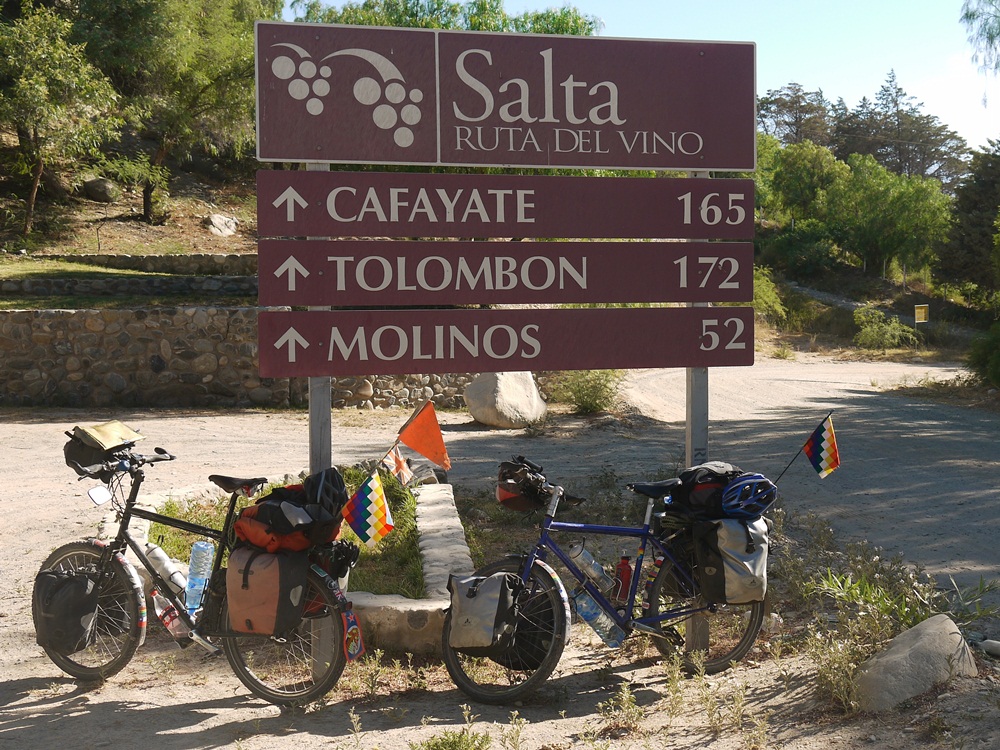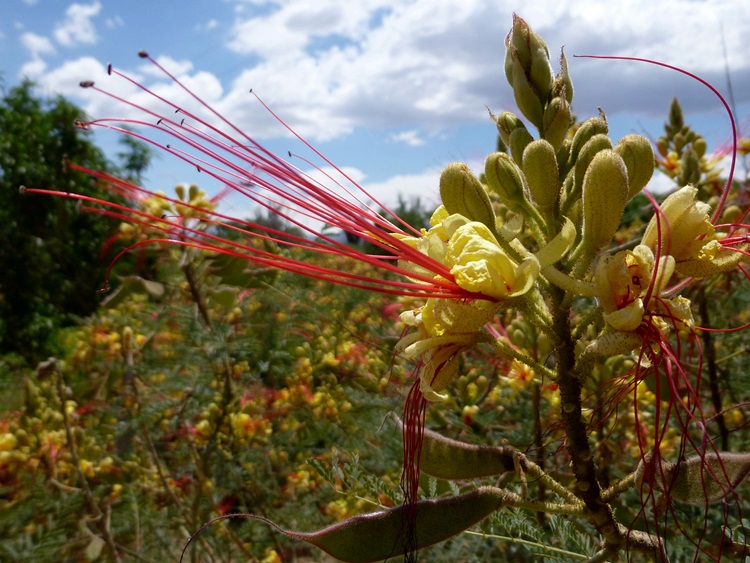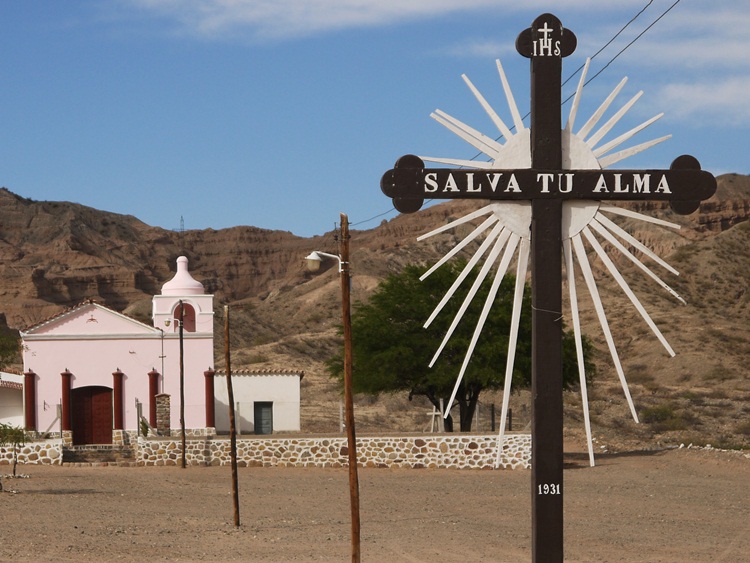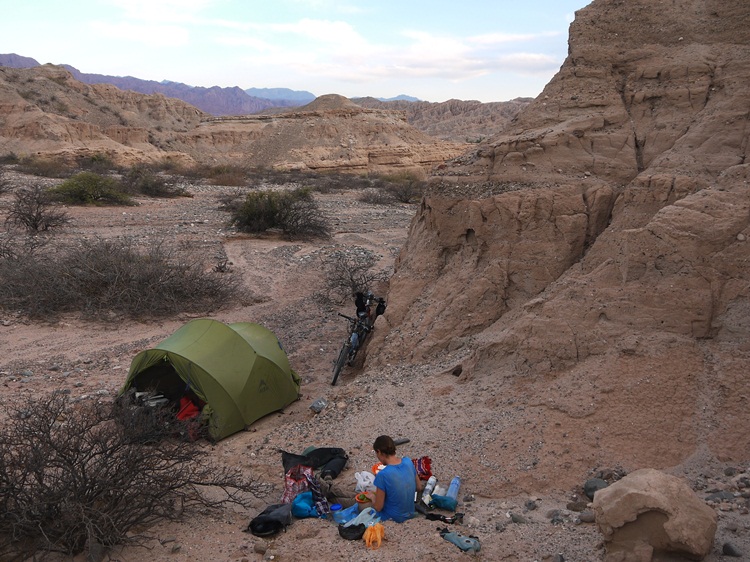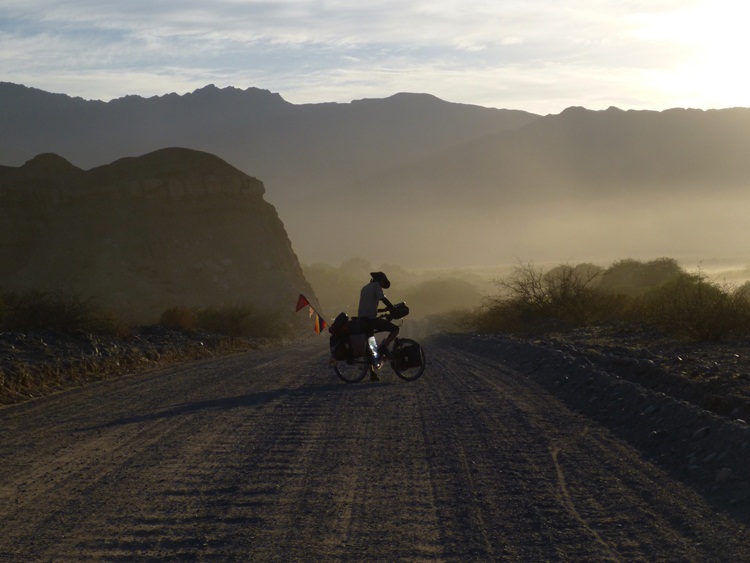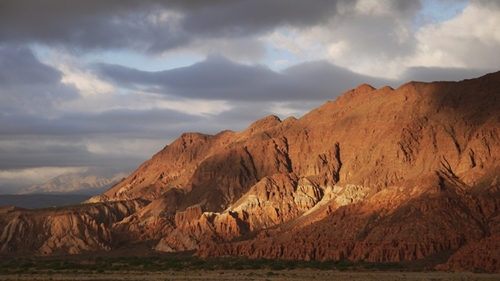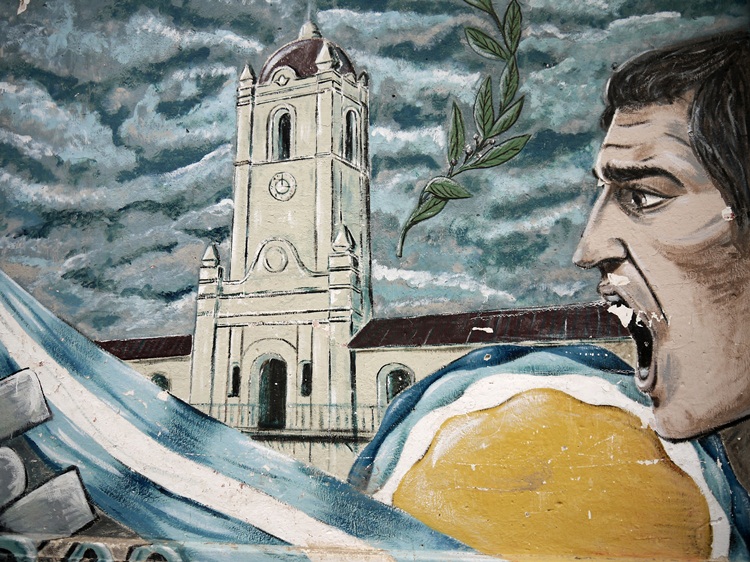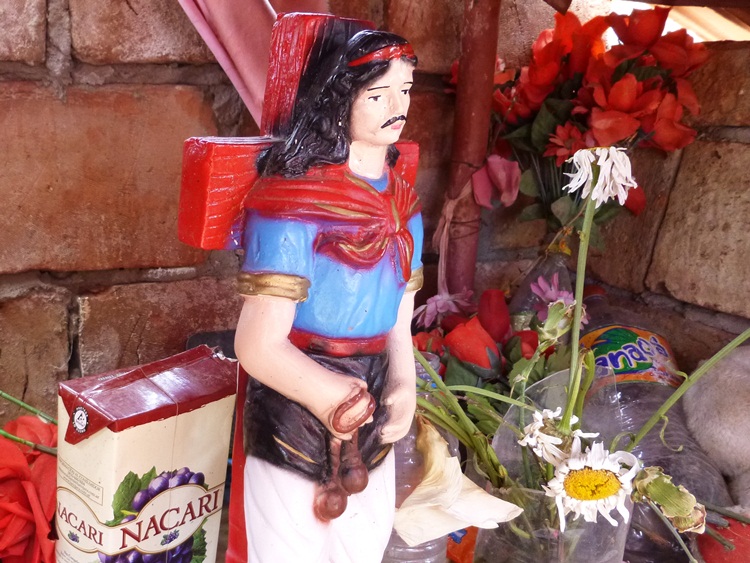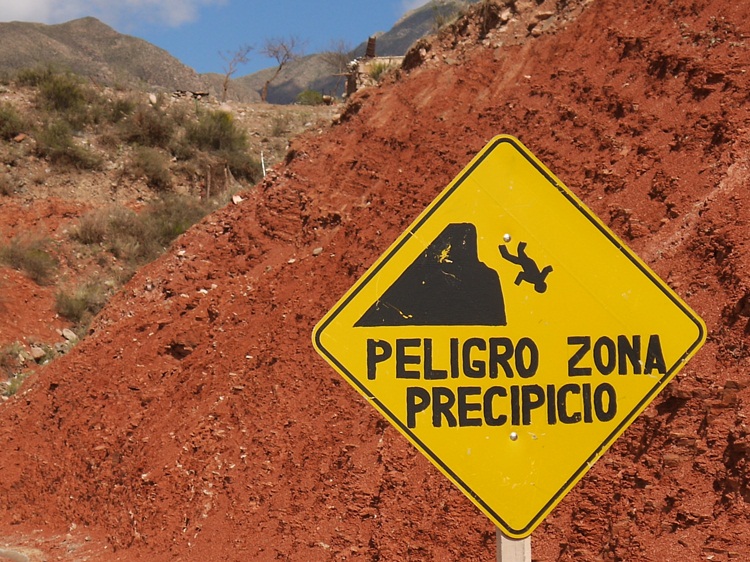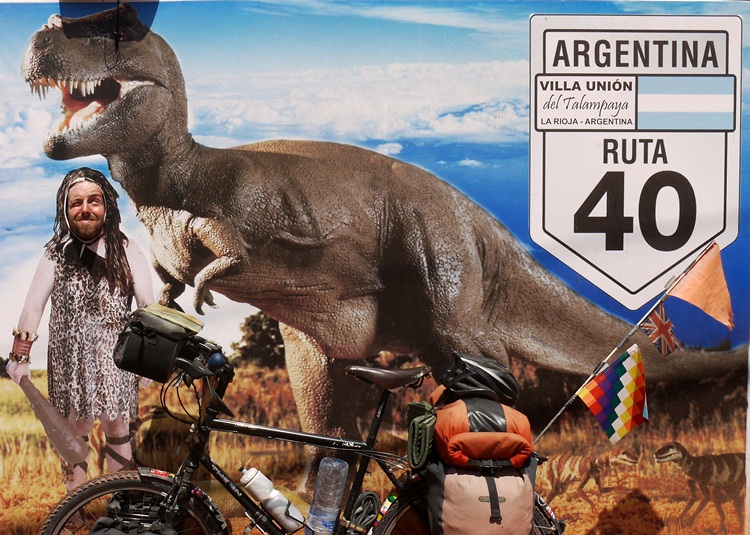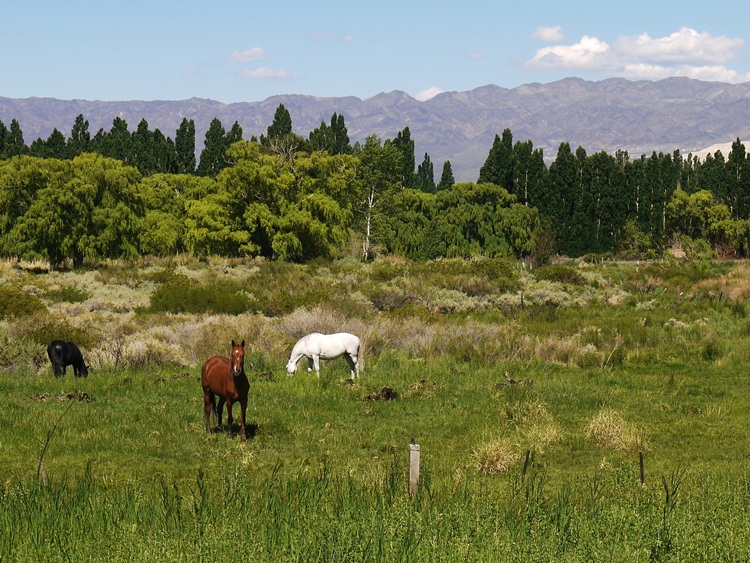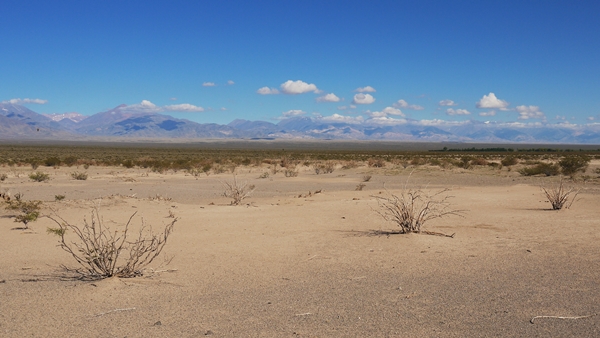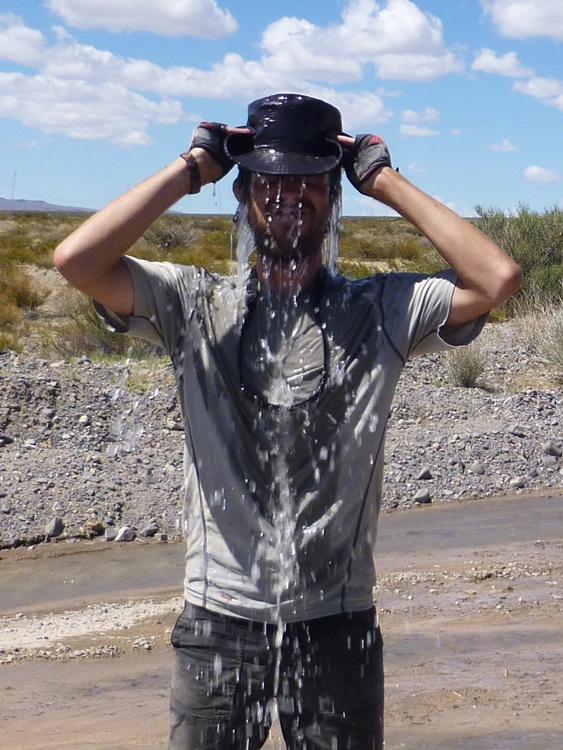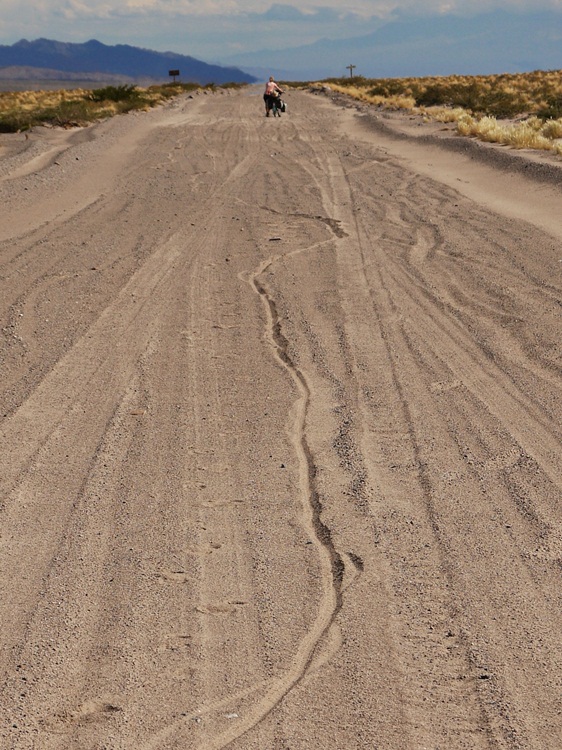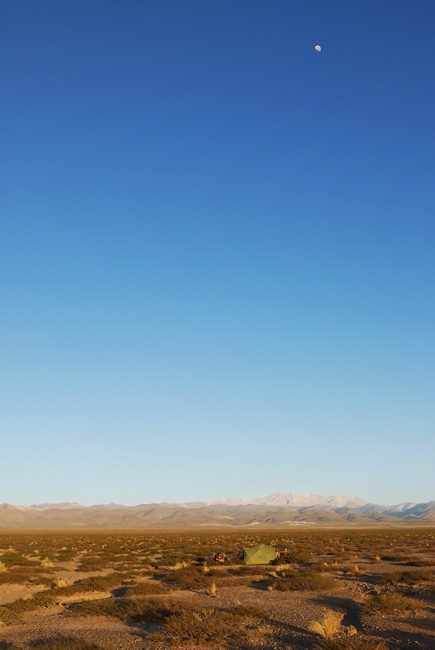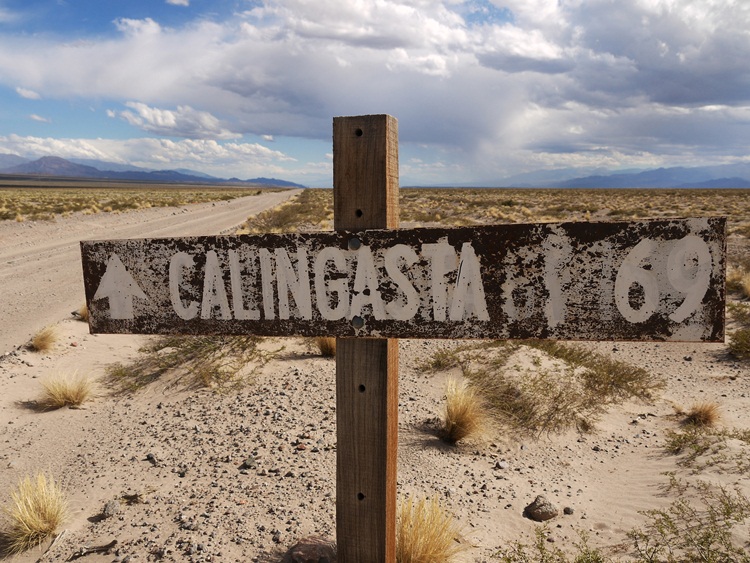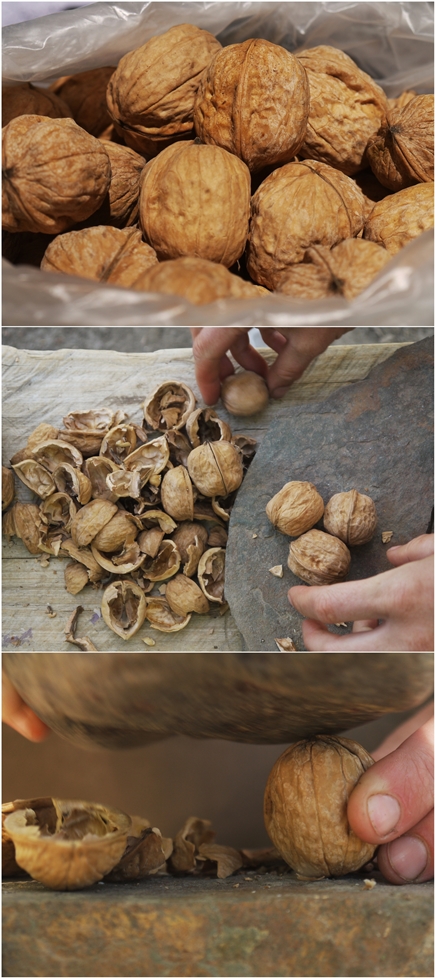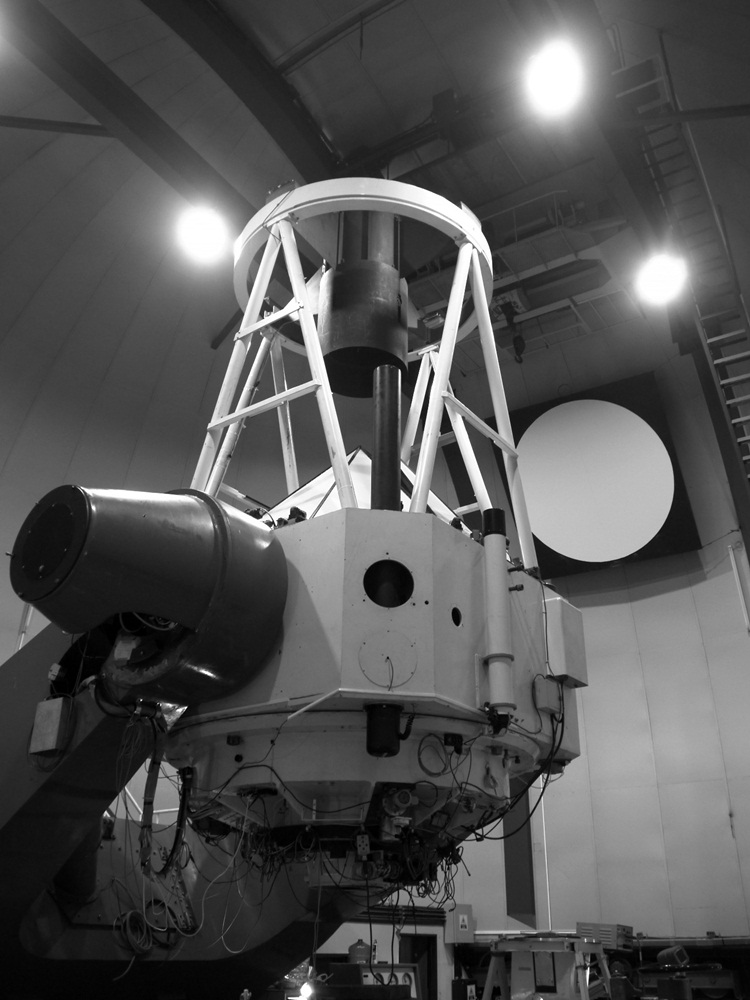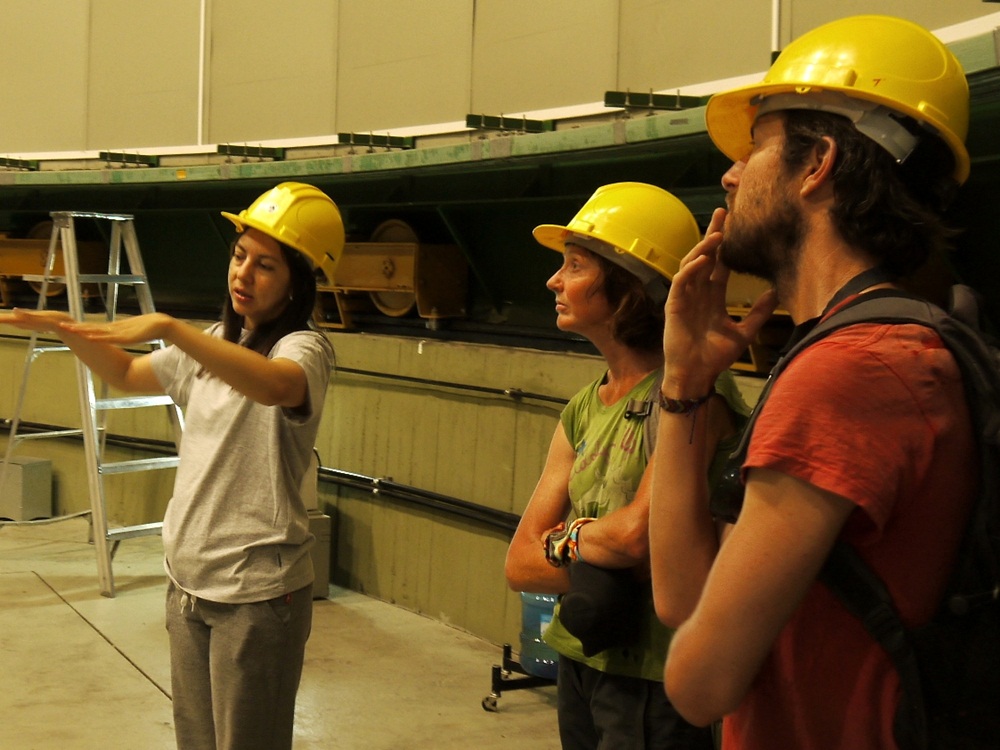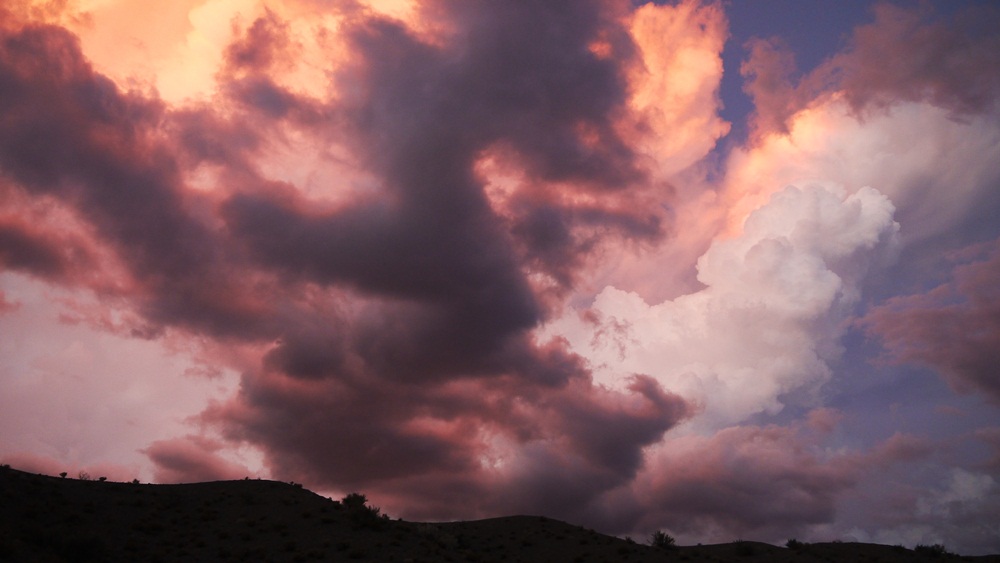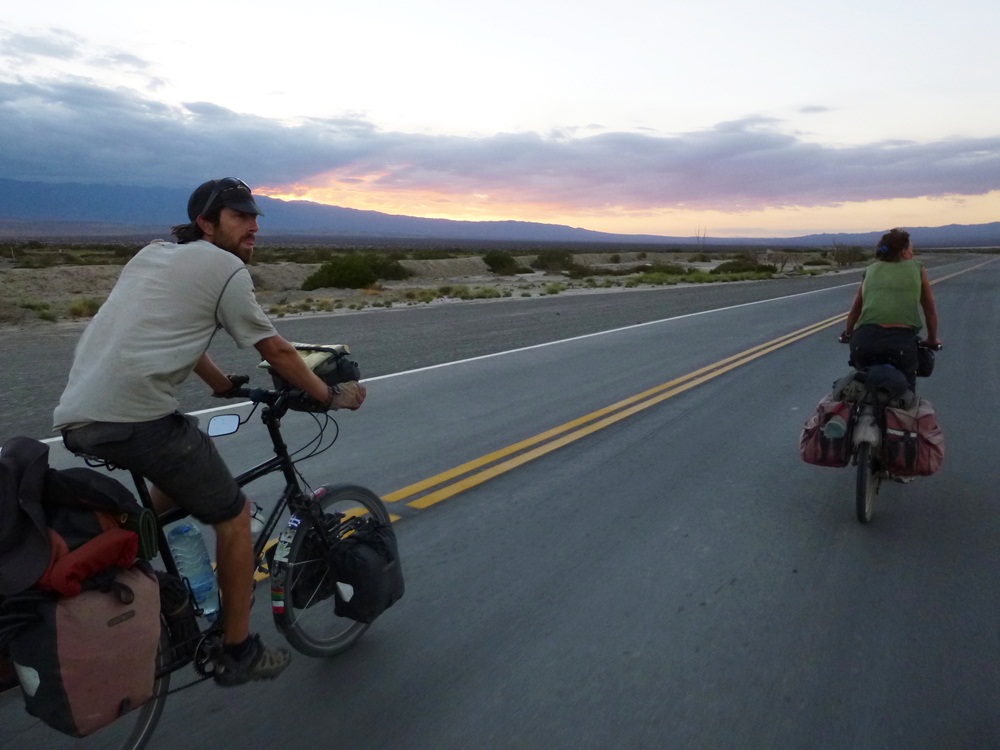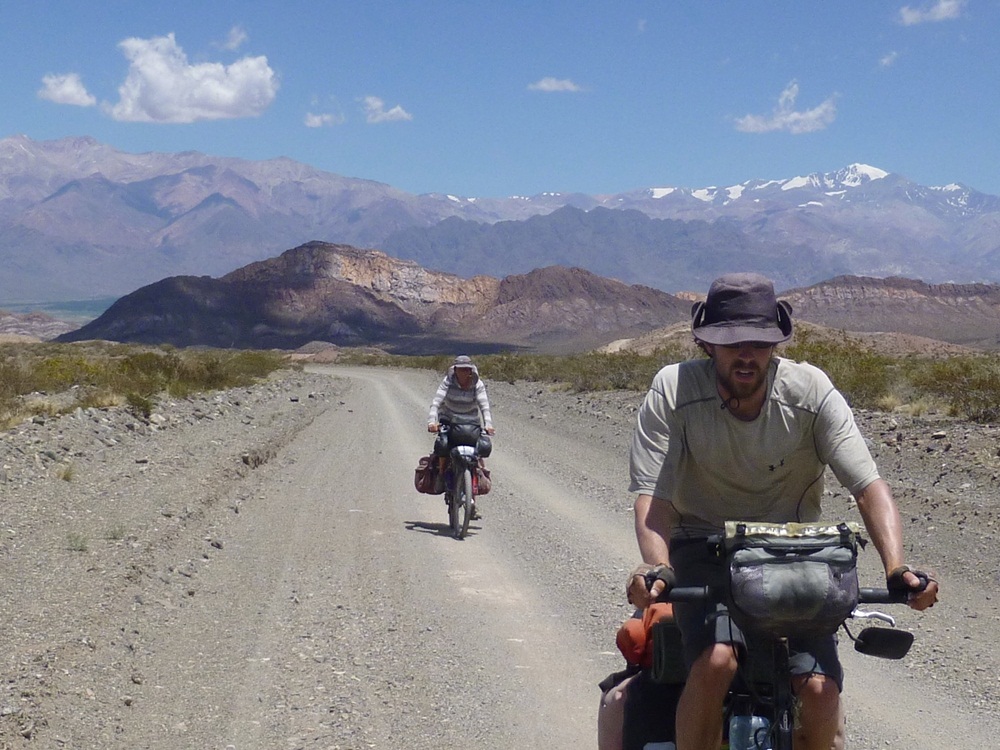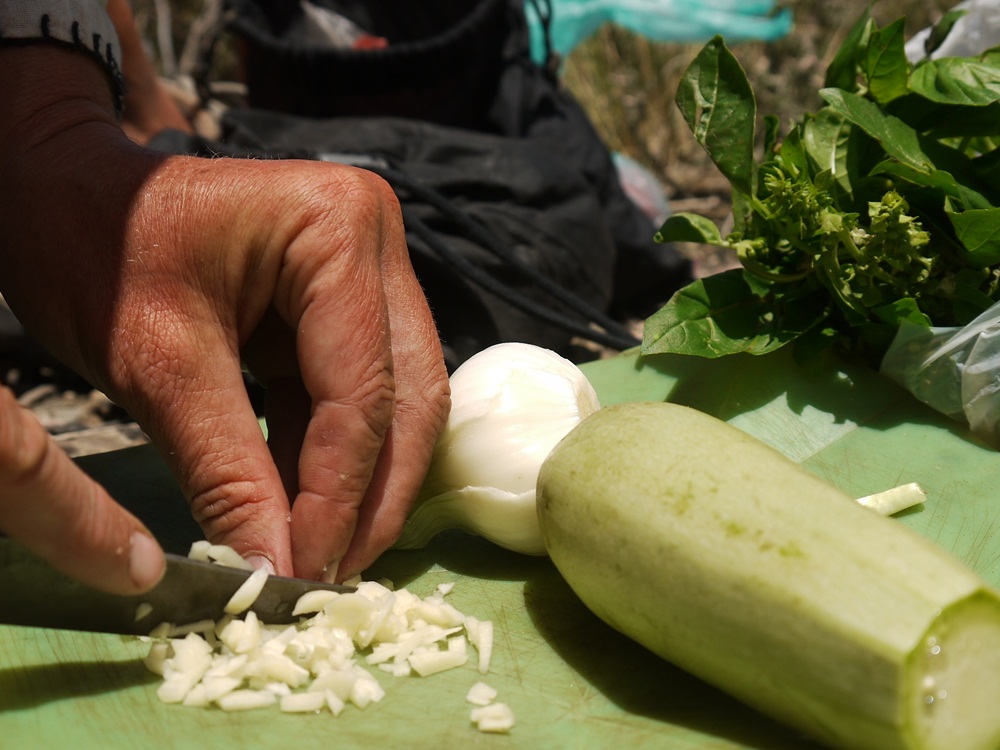A bittersweet love affair
December 1st, 2013
I have a tricky relationship with hills; at times it seems more complicated than the human relationships in my life. James simply says that I hate them, but that’s not entirely accurate. It’s true that I don’t love them quite as much as he does. Instead, my hills and I have all the highs and lows of a love affair: anticipation, thrills, desire, anger, hatred, defeat, frustration, elation. I go through more emotions during a big climb than you’re likely to find in even the most melodramatic of Latin American telenovelas.
I loathe the flat straight boring roads of plains and coasts and find myself longing to be amongst the mountains when we are not – but put me on a 25km+ dirt climb in the heat on a fully loaded bike and I am sweating, swearing under my breath and willing the ordeal to be over. On reaching the top, feeling the breeze, looking over the other side at the delicious descent to come, all the grunt and pain is forgotten in an instant and the victory is glorious.
After so long riding through the Andes, you’d expect me to be accustomed to the emotional and physical rollercoaster they present but every new ascent remains a new battle. It’s recently become more complex by the unwillingness of my parasite residents to take the hint and go away. Trying to tackle a big climb whilst hosting giardia and blastocystis has been impossible at times, and in the past six months there have been too many occasions where we have had to admit defeat, turn back and re-think our route.
The parasite issue had begun to dominate our trip; not just during the hill climbs but on and off the bike in all situations, my body had been loudly and violently reacting to its unwanted squatters. I am sure I present a conundrum to outside observers: to all intents and purposes, fine – aside from a heavily bloated stomach and some fairly anti-social farting. But when the parasites are active, stomach cramps, diarrhea and most importantly a lack of energy, have made it impossible to ride my bike well and often forced me to stop.
Medical advice about how to treat my condition had been varied and mostly ineffective as I didn’t seem to be responding to the conventional trusted methods of anti-parasitic tablets (over twelve months, I have taken eleven unsuccessful rounds of medication). After one too many turnarounds and more than a year of generally feeling ropey, a doctor friend suggested that coming down from life at high altitude (at which the body is always under high levels of stress) might help my body recover and fight better. However, as we were on the verge of embarking on the infamous, high altitude Lagunas Route in a remote corner of south-west Bolivia, Stubborn Cyclist Syndrome won out, and we pushed on.
The parasites of course had other ideas, and just two days into what was supposed to be an “epic ride”, I am not capable of continuing and we return reluctantly to Uyuni, leaving our friend Anna to carry on.
Catching a train from there to the border town of Villazón seemed like the most practical option. The new plan was to begin again in Argentina; to ride at lower altitude, to seek out easier routes and perhaps to consider slightly smaller climbs that might allow me to recover and actually finish this trip. The jury’s still out on my parasitic friends, but in the meantime our first few weeks in Argentina offered plenty of welcome distraction – and just one big climb…
Sarah
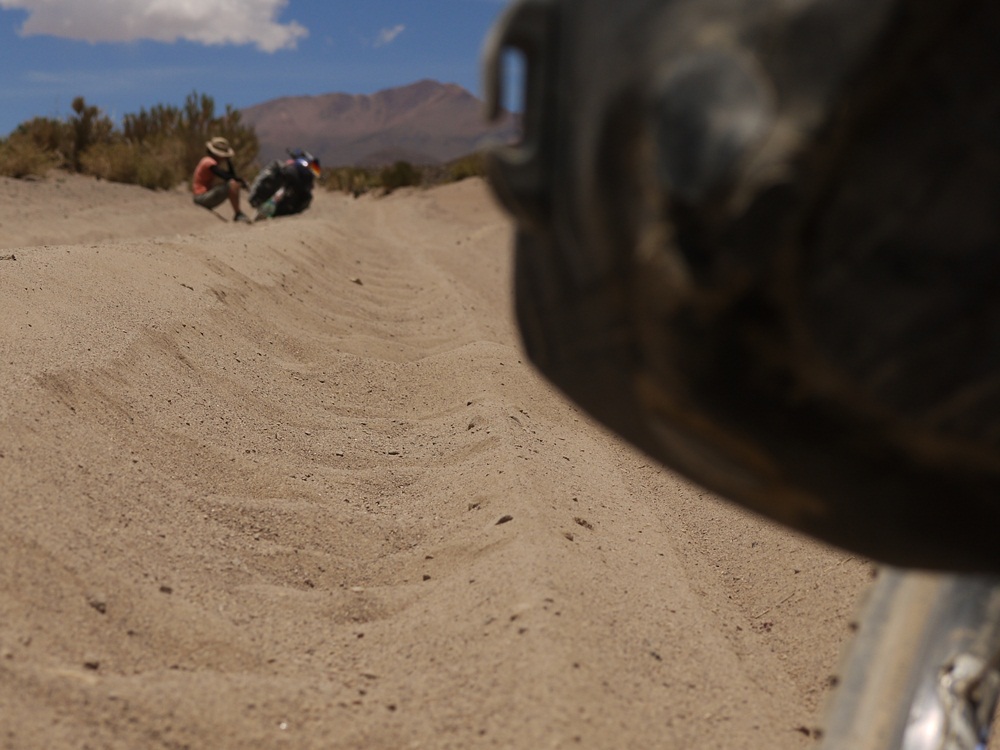
The moment of realisation – I am too sick to push my bike through deep sand and despite setting out with the best intentions to complete the eight to ten day Lagunas Route we admit defeat and return to Uyuni to reconsider our options. In one of the lowest points of the entire trip so far, we even go so far as looking at flights home.
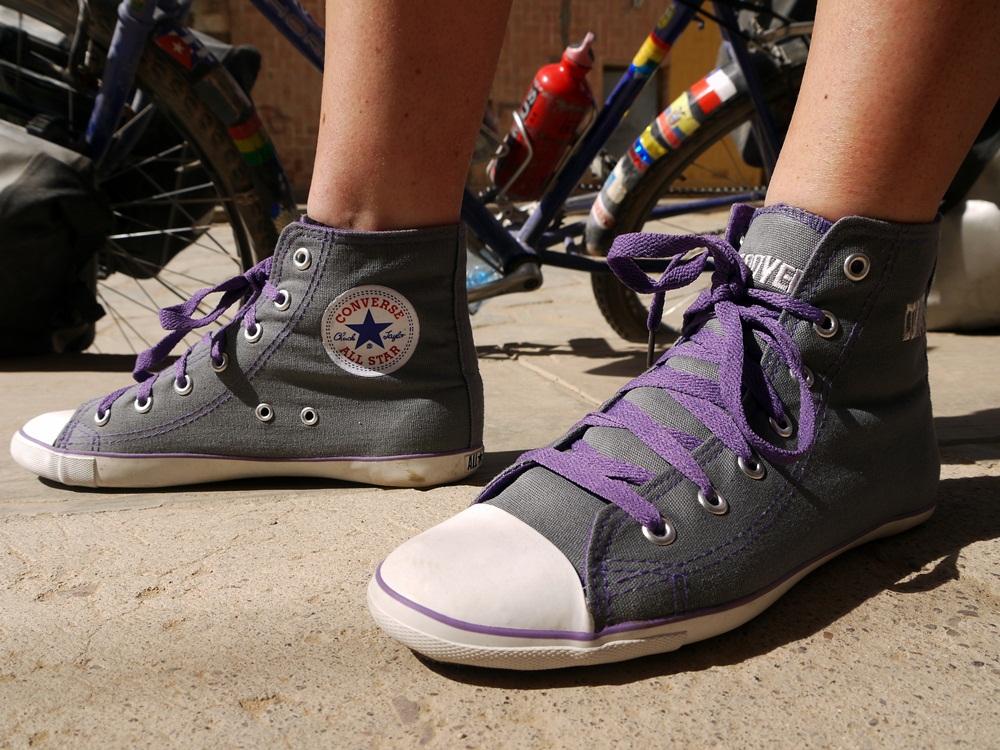
Whilst racking our brains about how best to continue, I suffer another blow when my shoes are stolen from outside a hotel room. The theft is the first in a sequence of events that soon develops into a saga ending with new shoes, new pedals and a new left crank. Interim shoes are also needed to get me through to the first decent sized town in Argentina. In a retro moment, I opt for a pair of lightweight Converse boots – the first time I have pulled on a pair since I was a teenager.
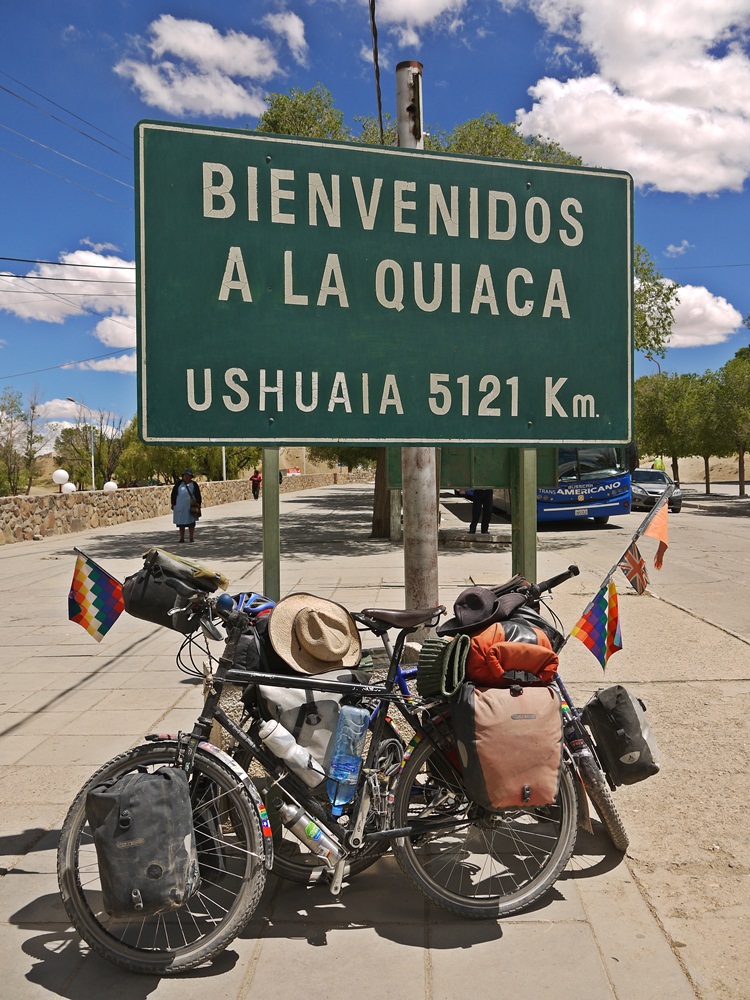
Shoe dramas temporarily forestalled, the decision is made to hop on a train for the final 300km of Bolivia and cross the border at Villazón. We enter Argentina at La Quiaca and, for the first time on this trip, are confronted with a road sign that tells exactly how far lies between us and our final destination of Ushuaia. Scary. It will in fact be at least 1000km further for us than this sign suggests as – of course – we won’t take the direct route there, but still…not far to go…
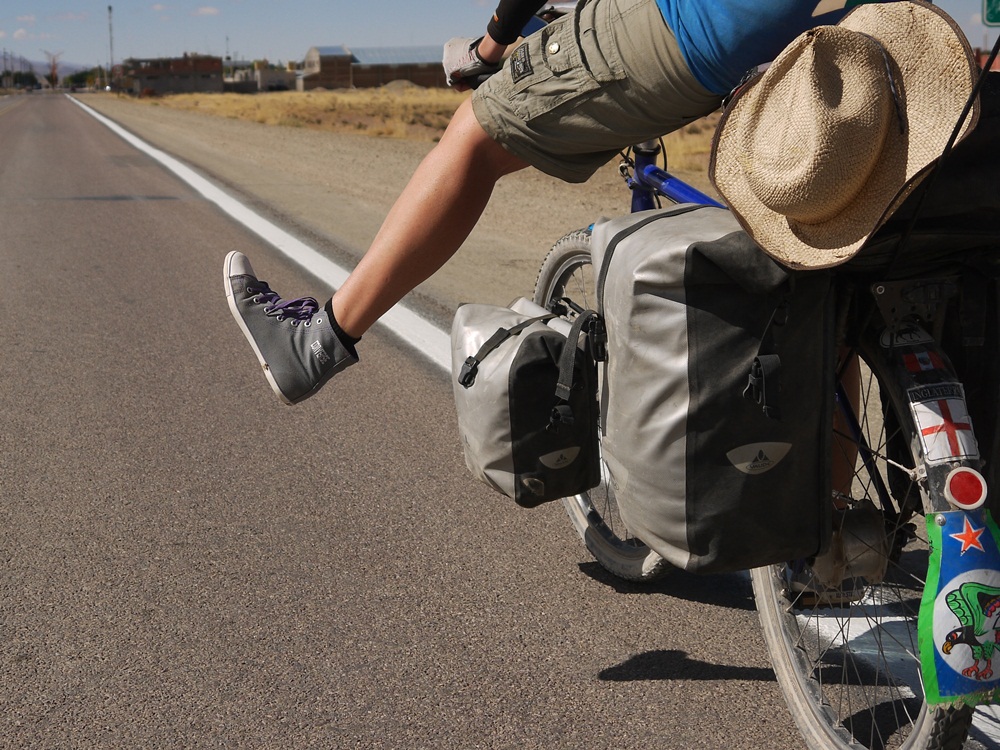
…and in Argentina, the road starts positively; we set out – happy to finally be making progress – descending to lower climes, and the new boots seem to be holding up well.
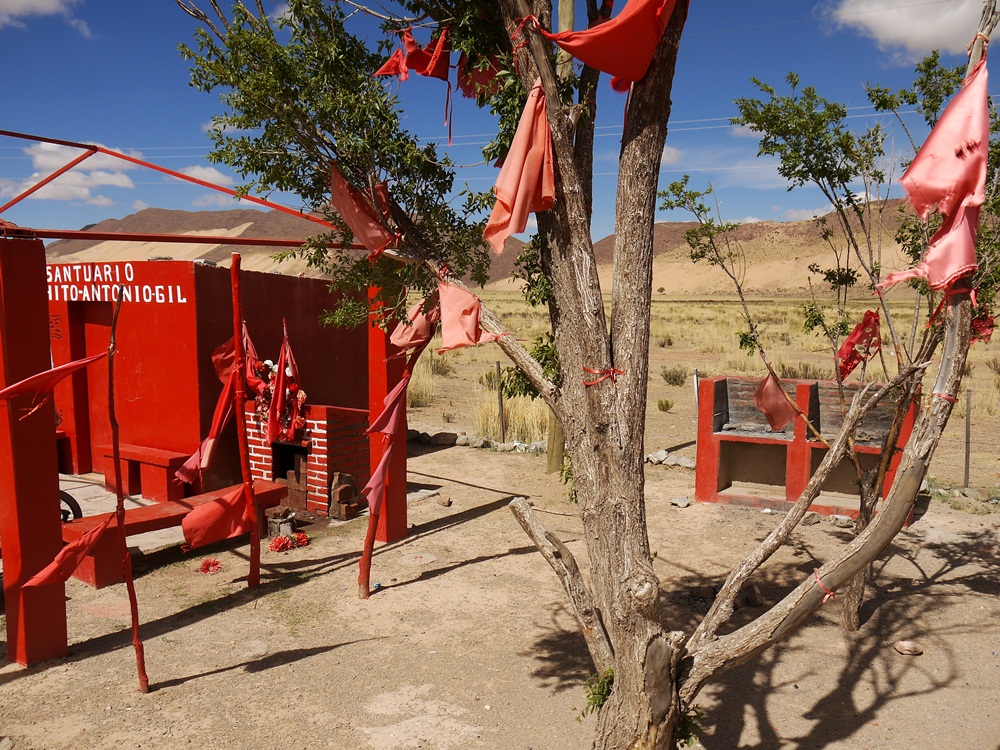
Argentina is a land of roadside shrines. Three popular saints dominate – San Expedito (patron saint of lost causes), Difunta Correa (a miracle in the desert where a mother died of thirst but her infant child was discovered alive still feeding at her breast)…
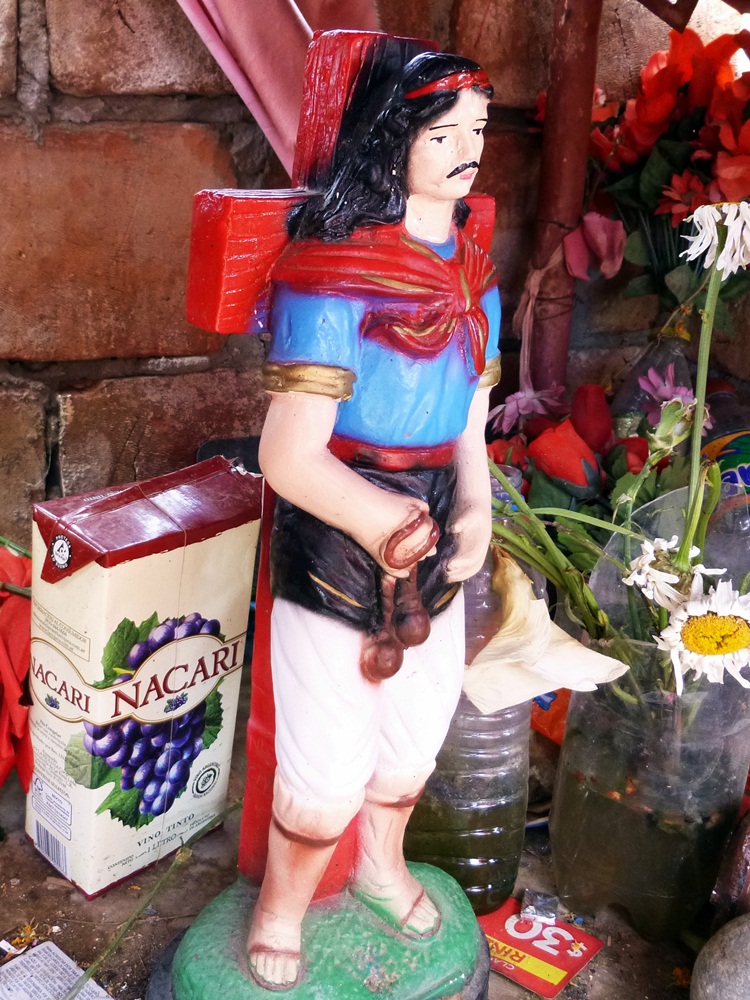
…and this chap – Gauchito Gil. A popular saint seen as something of a Robin Hood figure who broke the law to assist the poor and was executed in 1878. His shrines are always adorned in pure red, and even in the most remote spots, very well tended. People leave a whole host of offerings – from wine and cigarettes to entire bicycles and truck wheels.
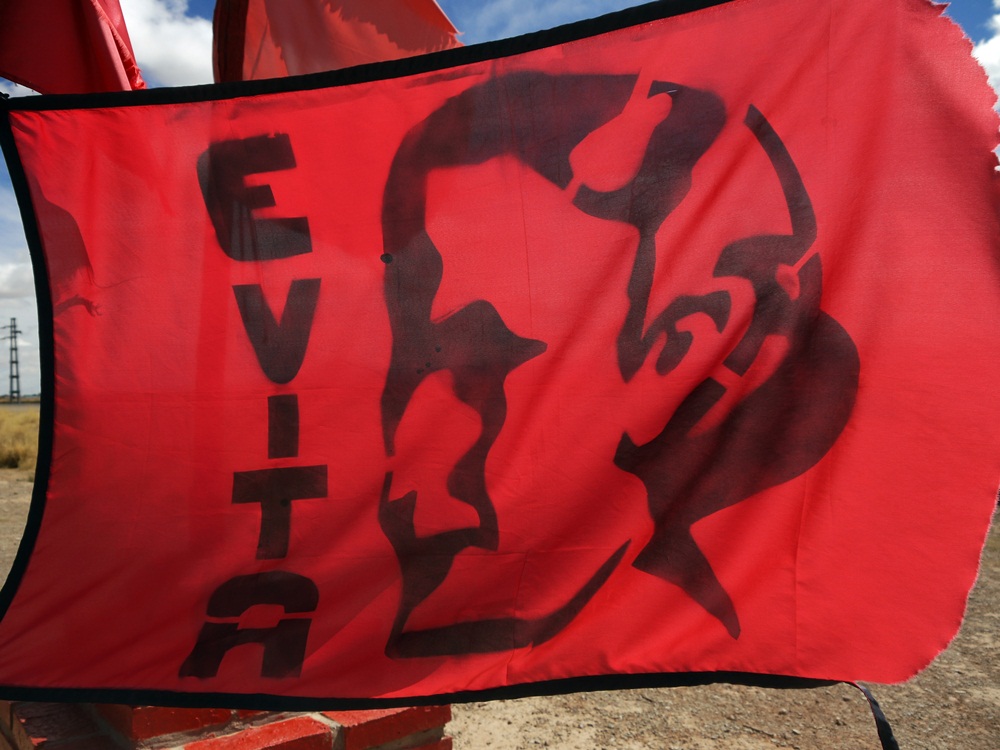
Occasionally the shrines also pay homage to other popular figures – here Evita, beloved wife of Juan Perón, Argentina’s president from 1946-1955 and again between 1973 and 1974.
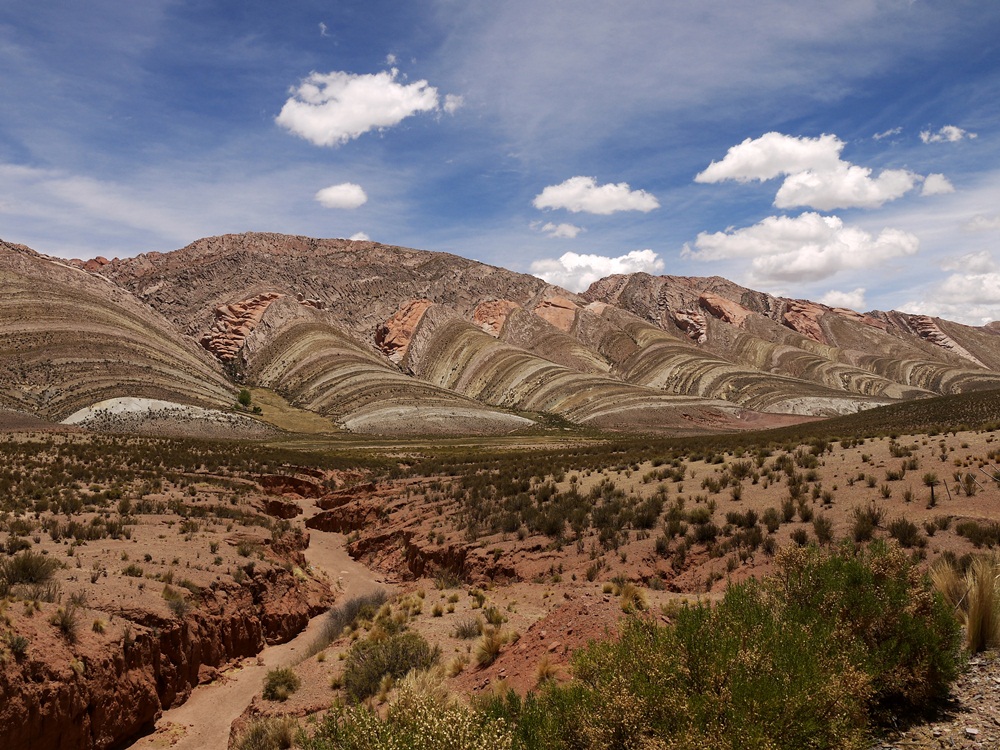
Our route from the border to Salta runs through the Qubebrada de Humahuaca with some beautiful rock formations to admire…
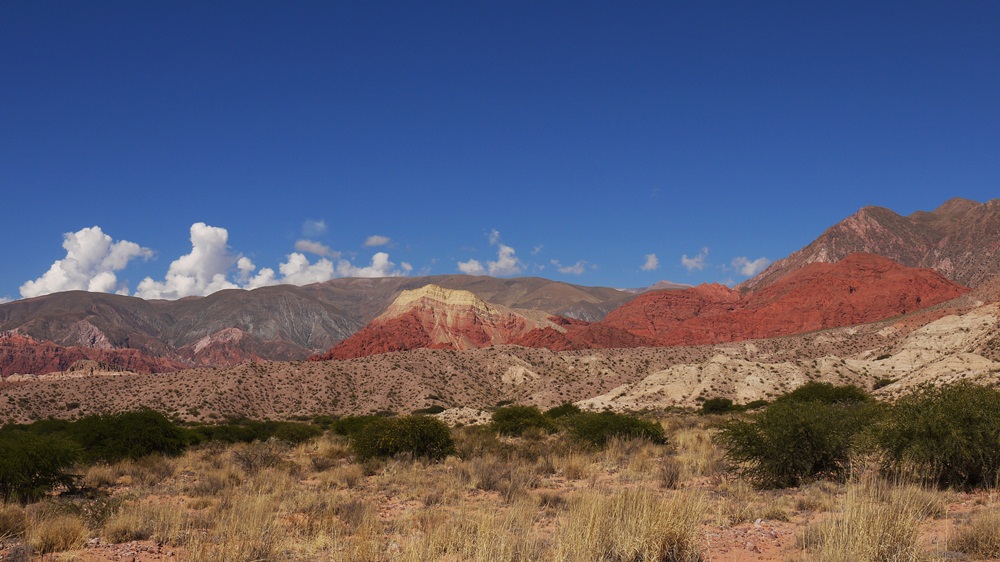
Riding towards San Salvador de Jujuy, we continue to soak up the colours, the shapes and the unanticipated heat of a new country
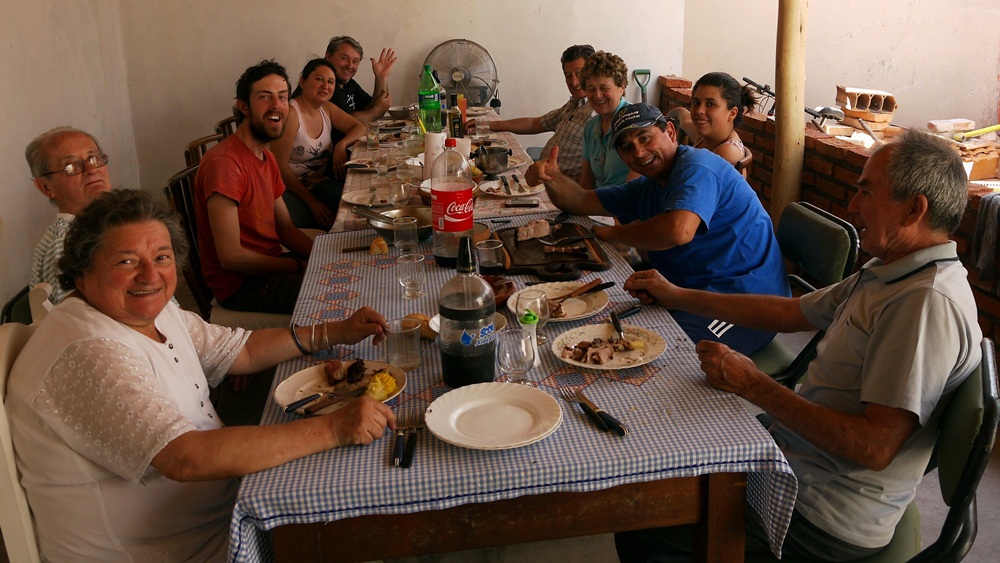
…until an invitation stops us unexpectedly in our tracks. Guillermo, local to Jujuy and out for a mountain bike ride early one Sunday, starts chatting with us and asks if we have eaten Argentinian asado (bbq). Having only been in the country for four days, it’s something we have yet to try and with no further ado we are invited to join the entire family for this sacred Argentinian tradition.
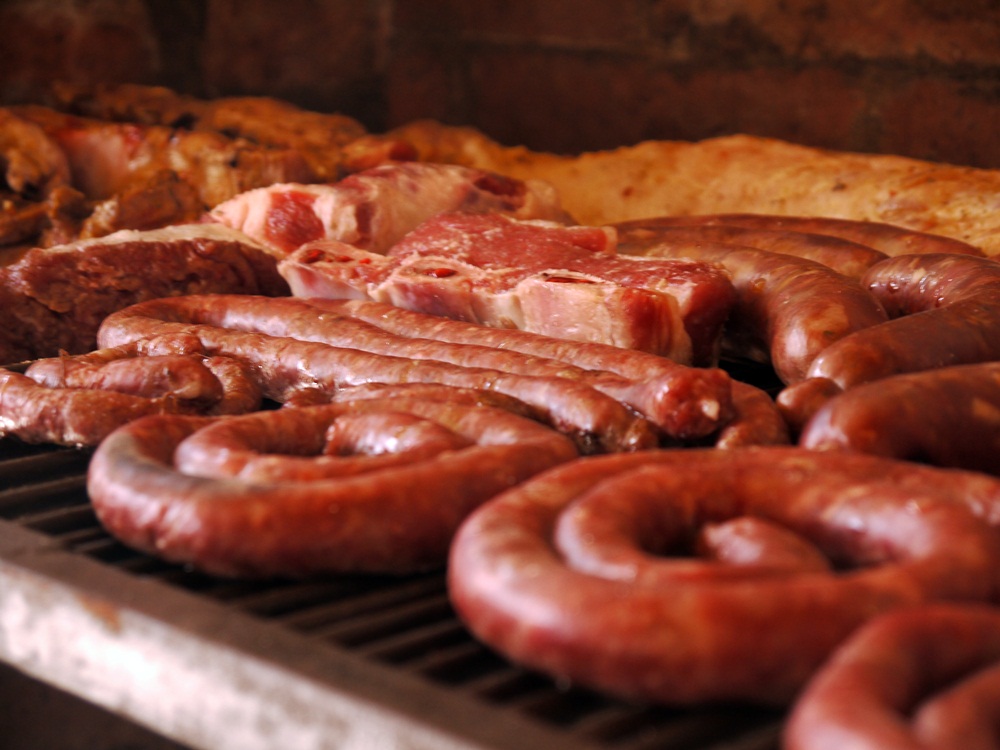
Practiced in most homes, on most weekends, an asado is much like the quintessential British Sunday Lunch where the whole family gathers to eat together. The differences show however in both quantity and preparation of the food – with around four times the meat and cooked outdoors over a grill and hot coals. Argentinian asado is a food experience we have been anticipating; having been to many a rainy bbq in England, we receive a valuable lesson in how the experts do it.
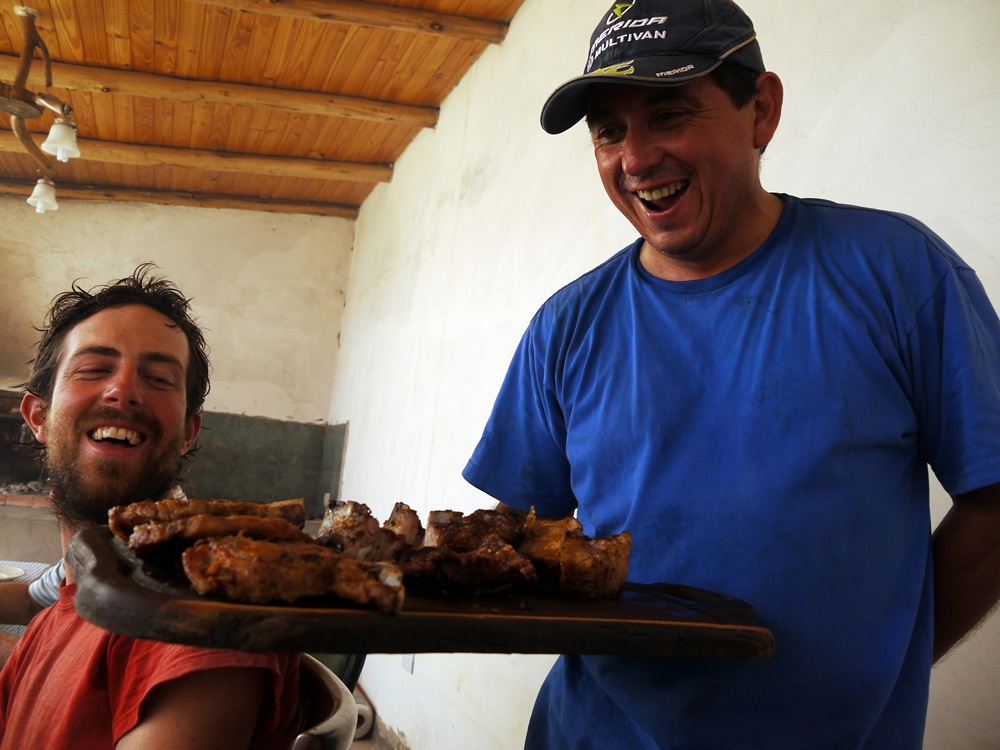
Proud chef Guillermo continues to deliver course after course of delicious cuts of meat to the table…
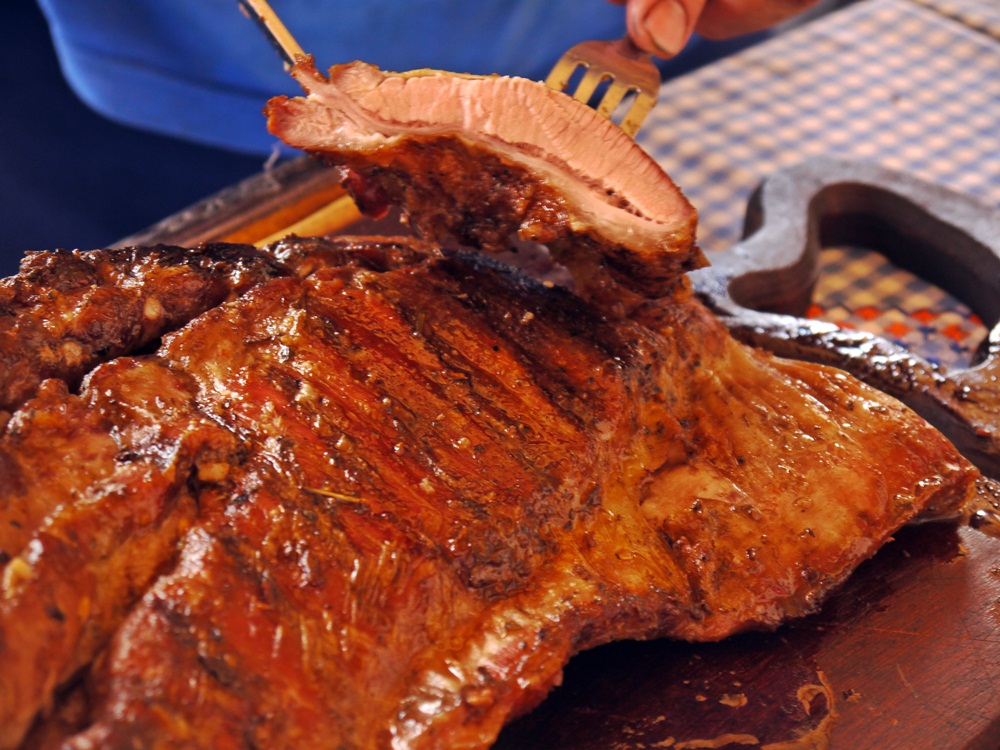
…long after we have room to fit it all in. This pork was divine and it seems Argentinian steak – that everyone had raved about before we arrive in the country – is truly deserving of the hype.
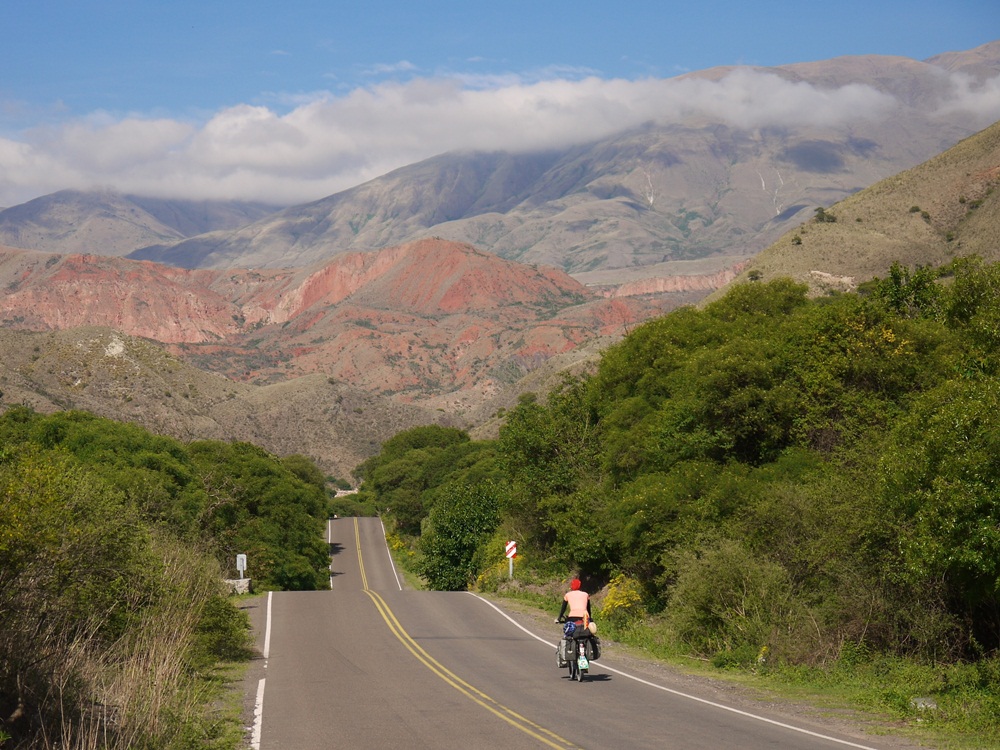
With meat filled tummies, we spend a few days in Salta planning the next leg and sorting out my pedal/shoe issues. In a rash fit of naivety, temporary good health and enthusiasm, we decide from Salta we will tackle the Cuesta del Obispo instead of sticking to a valley ride. Not a particularly big climb when compared to those we have ridden in Ecuador and Peru, it nevertheless represents a challenge to me. It becomes clear that despite still being fuelled by delicious asado, I am not back to full strength…
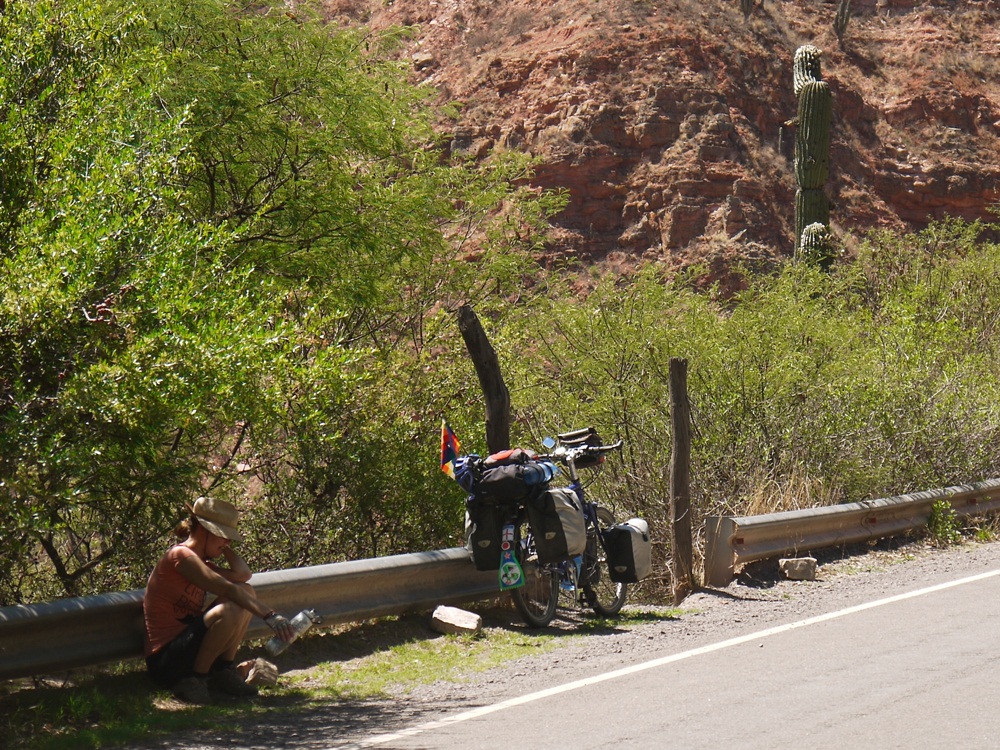
…and I find myself sitting by the side of the road once again cursing hills, parasites, baking heat and anything else around me that can be blamed for my lack of performance.
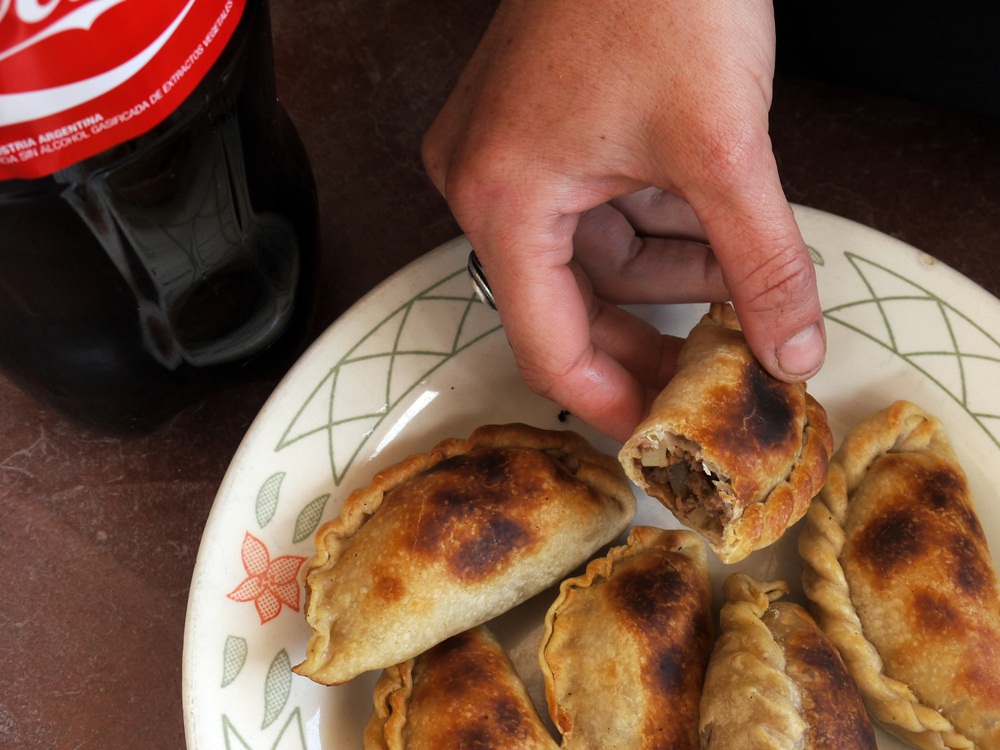
This time though, we don’t turn back but James wisely calls an empanada stop. Delicious parcels of pastry and meat combined with cold Coca Cola help us on our way…
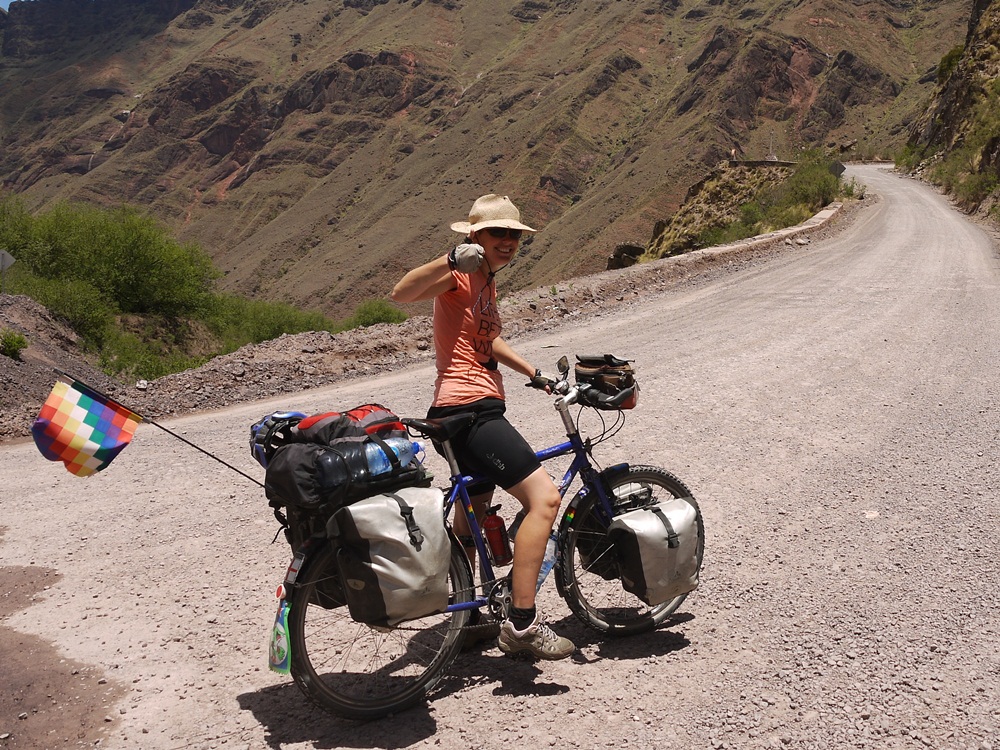
…onto a dirt climb of some 25km which will take us back up to an altitude of 3457m – the fake positivity displayed here didn’t last long…
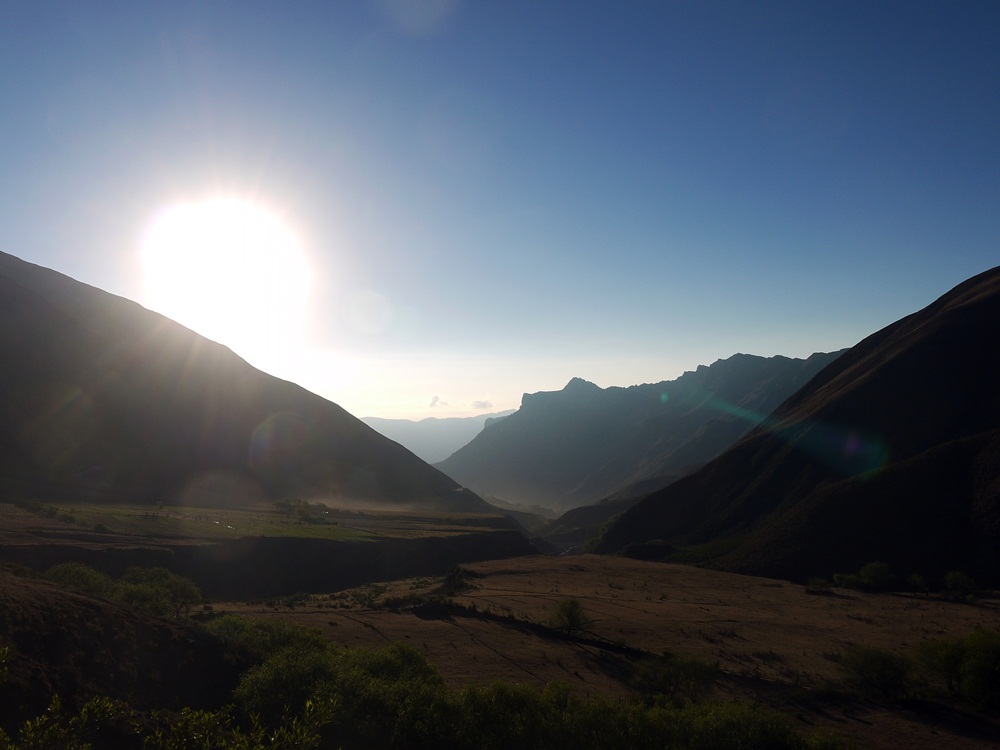
Deciding that the climb is too much for me in one day, we make camp and tackle the rest early the following morning…
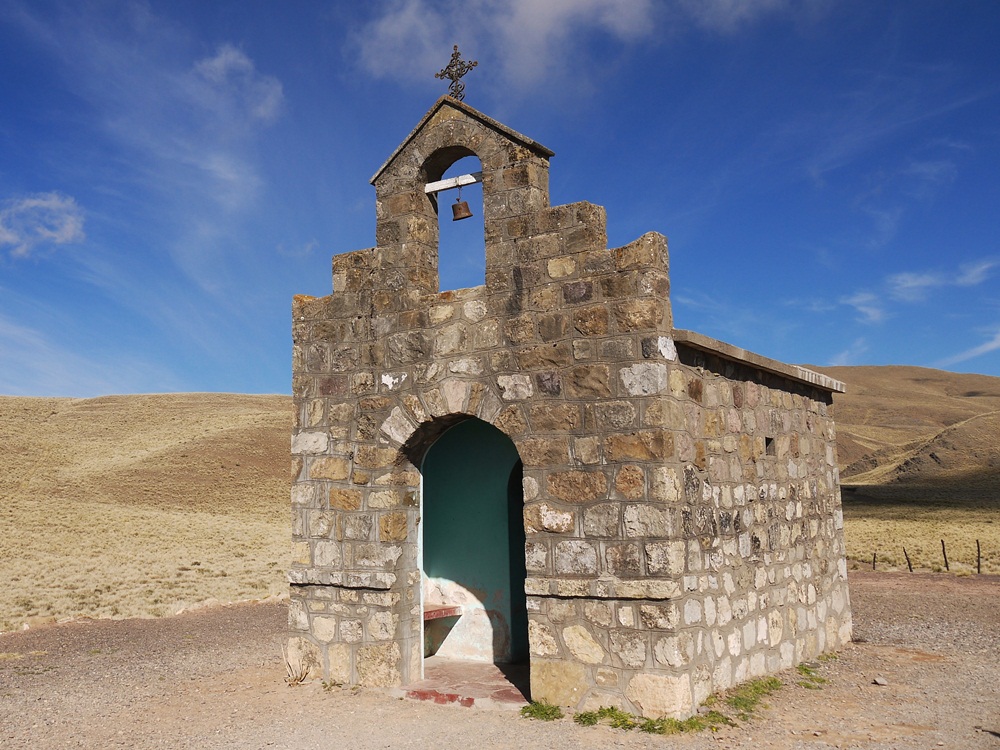
With some relief we reach the top and, as always in my complicated love affair with hills, the emotions swirl and compete…
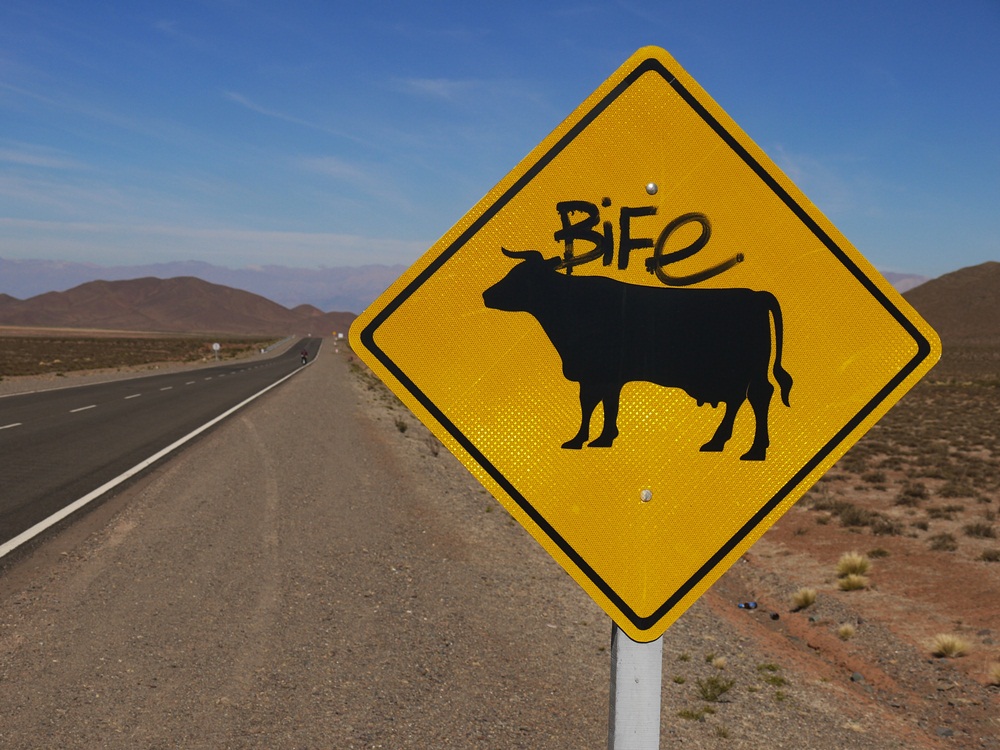
…and we whizz by a reassuring testament that Argentians definitely know where their meat comes from (bife = steak).
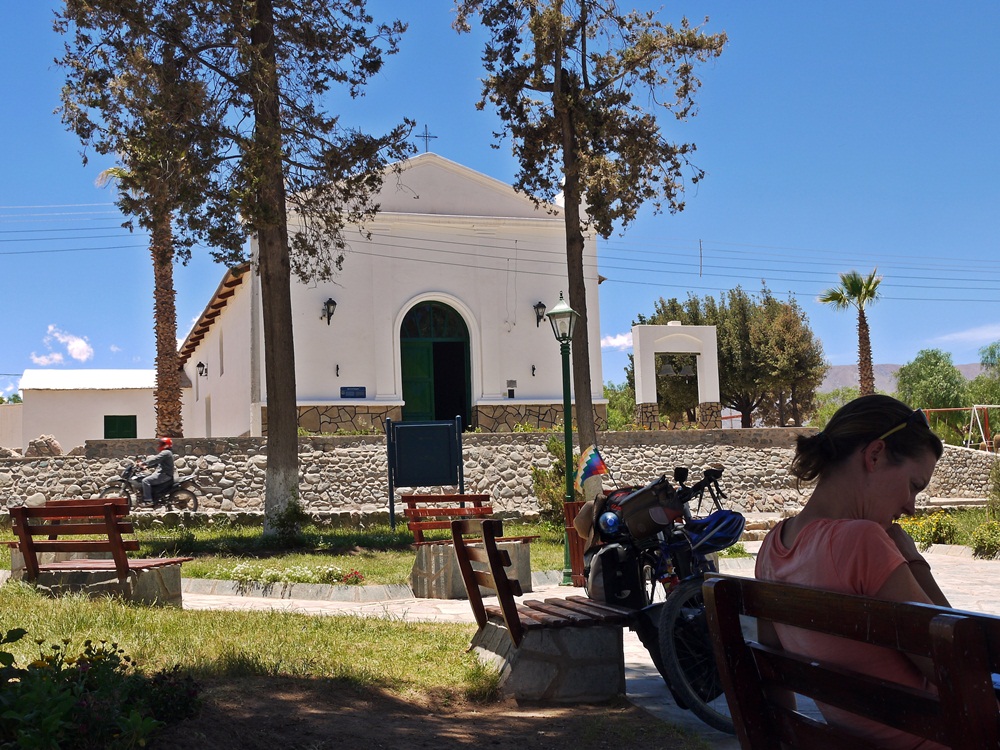
…and we arrive in the small and welcome town square at Payogasta for lunch in the shade. Every small village in Argentina seems to boast a beautifully kept, pretty, tree shaded square with strong Spanish overtones. They beckon us to retreat from the sun and enjoy a long siesta.
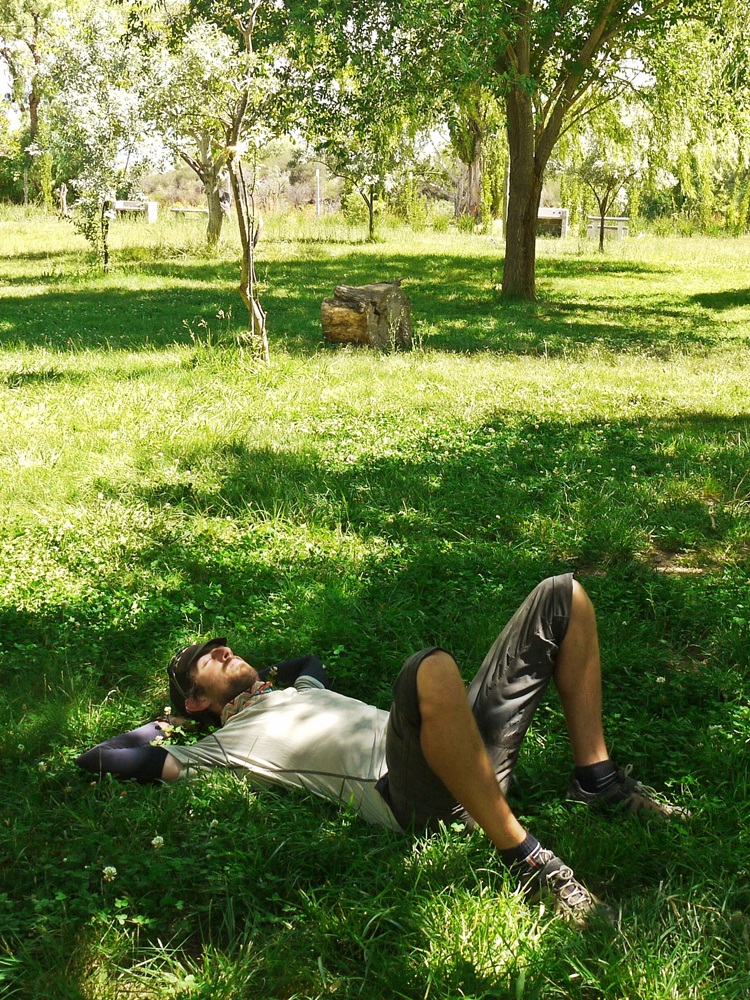
Most towns also offer good municipal campsites. Having become accustomed to ‘roughing it’ with wild camping, these havens of green with facilities and bbqs have added to the culture shock we have been undergoing since entering Argentina; a much more affluent and ‘European style’ of living.
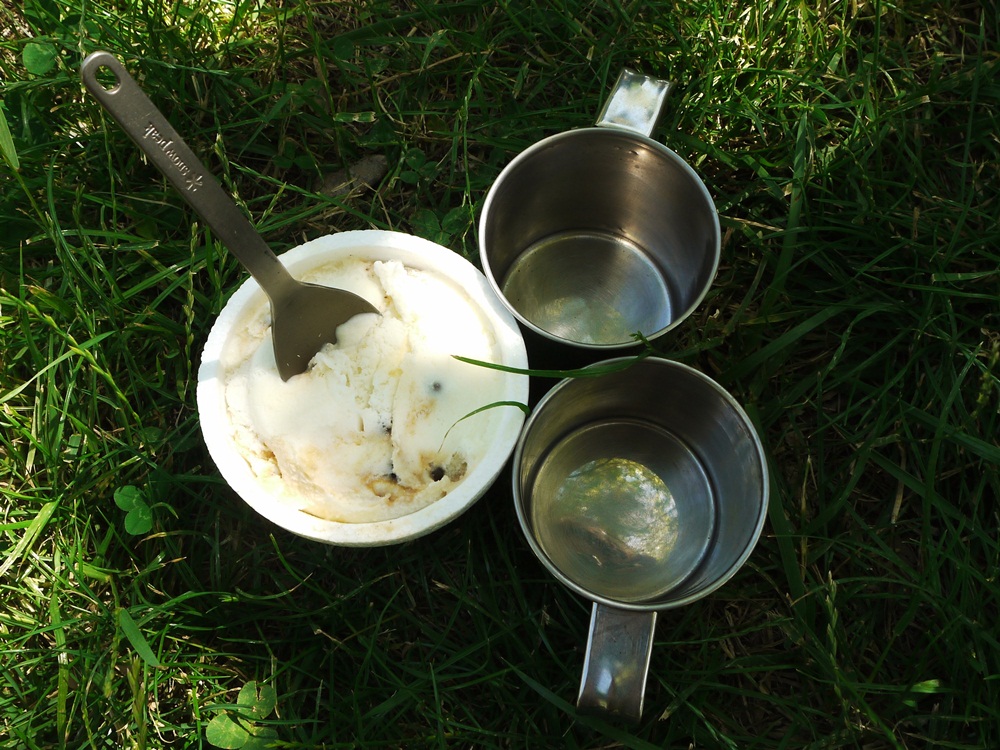
It doesn’t take long in a new country for us to discover our favourite treats. With an abundance of ice cream shops here it’s a done deal, a cyclists’ dream: we can eat ice cream every day. Now we just have to discover our favourite flavour: current winner is tramontana – vanilla ice cream with caramel and small chocolate covered balls of biscuit.
La Ruta 40
December 20th, 2013
As I slumped down into the sand in our chosen patch of desert scrub for the night, flies simultaneously tried to swarm into my eyes, up my nose and into my mouth. I peeled my shirt off my back, un-sticking a three day paste of dust, sweat and sun cream as it went. I cast my mind back over the last 8 hours: 100km of dead flat, scrubby desert into a headwind, with the highlight being a bend at 30km. How exactly did we end up on this road, I asked myself?
I thought back to what other cyclists had told us about northern Argentina: the asados, the red wine, the ice cream, the warmth of the Argentines. Not once, I now noticed, had anyone mentioned the roads as a highlight – in fact the opposite. “Don’t bother with Ruta 40 after Cafayate” they said. “Take the bus – there’s nothing to see”. And it’s true, after the dirt road adventures of Ecuador, Peru and Bolivia, riding the northern deserts of Argentina along Ruta 40 was – to put it lightly – something of an anti-climax.
However – as we’ve learnt many times over the past two and a half years – on a long bike trip, context is everything. And, for us, that context was sitting in an internet cafe in Uyuni, Bolivia a month earlier, hovering over “Buy now” on a direct flight back to London. After a year and a half of on-off sickness and a further two months lost off the bikes in Peru and Bolivia, we had reached a tipping point. This trip was always meant to be fun, and right now the fun was seriously lacking.
In the end, we didn’t click. We decided to give it one last roll of the dice, in the hope that the lower altitude, better hygiene and warmer weather of Argentina would weave a miraculous cure. That was why I was sat in this desert, riding this road. And, given that context, Ruta 40 was probably one of the best roads we have ridden for a long time. It was flat, fast and paved – everything we would usually go out of our way to avoid. But now, it gave us the perfect chance to regain some of our fitness and confidence, with a healthy dose of direct southerly progress thrown in. If we wanted to reach Ushuaia before winter did, then southerly progress was exactly what we needed right now.
And so was this leg of Ruta 40 really the tedium-filled sweatfest that everyone had made it out to be? Well, not really. For sure, it had its moments. Yes, it was searingly hot. But try a few weeks of pulling on sodden clothes every morning in rainy Patagonia and you’ll soon realise what a pleasure it is to camp in the warm and dry every night. And yes, there was some ugly, uninspiring desert. But we also saw plenty of beautiful desert, and with it experienced the unique peace and solitude of a desert camp miles from the nearest human being.
As always on routes which don’t run past “must see” places, I was reminded that it is the small things that are at the heart of what I really love about bike touring. A moment of exquisite dawn light. A hat tipped in greeting. The shade of a tree at midday. To anyone else they are incidental, un-noticed even. But on a bike, on these routes with “nothing to see”, these the are the things which come to the fore; the memories that you will dream about for years.
And when it felt like we had come so close to losing those moments before we were ready, it was just bloody good to be back on the bike again; doing what we love and immersing ourselves back into the hypnotic daily rhythm of this simple life on two wheels.
James
Ruta 40 is a an Aregentine classic, running 5301km from the Bolivian border to the Straits of Magellan at the tip of Patagonia. Depending on the state of your legs and the direction of the wind, that rolling countdown can either make you feel heroic, or just downright miserable.
We join the 40 at Cachi, after crossing the Cuesta del Obispo from Salta. This dirt ride to Cafayate proves to be by far our favourite section. Up and down we roll through the Valles Calchaquíes…
…with immaculately tended squares, and gleaming social housing projects. It all feels a million miles away from the bleak harshness of the Bolivian altiplano.
…and so it would be rude not to taste some – even if, like me, your wine knowledge doesn’t stretch much beyond “Ooh, that’s a nice label”.
After Cafayate, we’re onto pavement. This is undoubtedly the 40 at its tedious 50km-without-changing-direction worst.
Of course, it’s vital to keep energy levels up: always ensure a good stash of Frutigran – Argentina’s official cycle touring biscuit, straight out of the ovens of the Seventh Day Adventists.
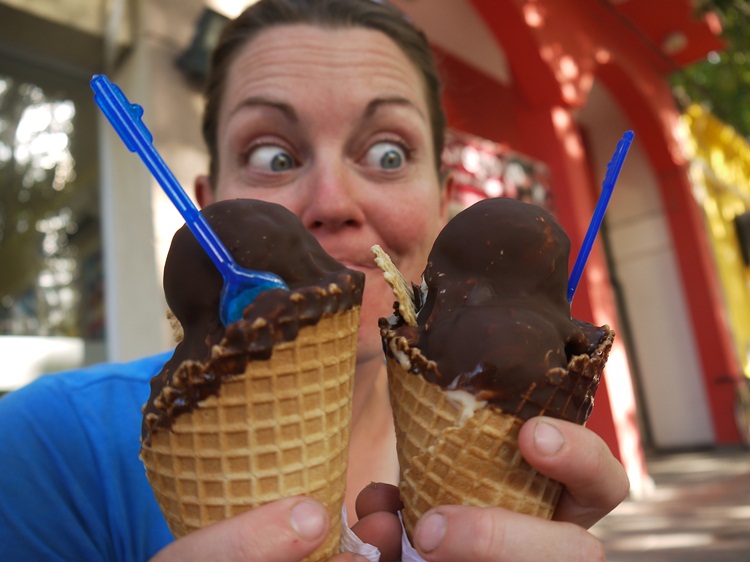
…but come mid-afternoon, the race is on to the nearest town to score the daily ice cream fix. Don Facundo Grido, we salute you – if not always for artesan flavour, then always for good, honest, peso-per-scoop value for money.
Before long they’ve whipped up an enormous batch of crêpes bretonnes with a delicious caramel topping, which lasts us for the next couple of days.
Still fueled by crêpes, we head up into the all-too-brief coolness of the Cuesta de Miranda and onwards to San José de Jachal. Here, we sadly say our farewells, as the French take a direct route south to visit some organic farms.
We leave the 40 behind and head south west towards the Cordillera and some dirt. It’s a dramatic change in landscapes: the greys of the Cuesta del Viento…
Stuffed Cyclist: a Christmas recipe
December 24th, 2013
Ingredients:
– 3 mature touring cyclists (choose cuts with 2+ years on the road for a lower fat version)
– 5kg of mixed food per cyclist (opt for quantity over quality, use pasta and porridge as a base)
– As much Argentine red wine as you can carry
– Copious quantities of coffee (if desperate, even the terrible Argentine stuff will suffice)
– One national park with a view and free camping (Parque Leoncito recommended)
– Two observatories for star gazing
– To decorate, a sprinkling of Christmas cheer
Method:
In preparation, pre-heat your grill to “Northern Argentine desert” setting. Once at 40 degrees, take your cyclists and grill slowly but continuously for two months, rotating occasionally to ensure even sunburn. Keep them mildly dehydrated, and marinate in sweat and factor 60 sun cream at least twice a day. Maintain a safe distance from showers or other washing facilities at all times.
A couple of days before Christmas, fill cyclists’ panniers with food and drink until expletives begin to flow continuously. Pedal mixture vigorously to your chosen camp spot, ideally into a vicious headwind. Pour mixed food into cyclists and allow them to rest in the shade until stomachs begin to rise slightly, and ribs become less pronounced. At this point, feed again, and continue this routine for the following 3 days. It may seem obscene, but for best results at least every 30 minutes is recommended.
When necessary, loosen mixture from time to time with a little coffee (especially early mornings) and red wine (afternoon and evenings). On at least one occasion, try to douse your cyclists thoroughly in water with a little added soap. They will complain, but can often be lured into water with leftover scraps. Throughout, keep your cyclists covered under a blanket of cloud. Then, on the evening before serving, remove clouds and bathe your cyclists in perfect starlight.
Finally, your stuffed cyclists are ready to be served – top with a healthy sprinkling of Christmas cheer. However, by this point, I guarantee you will be so repulsed by their smell and habits that the prospect of actually presenting them to your guests will be appalling. It’s probably best just to let them and their strange ways be. Release your cyclists back into the wild for another year – and next Christmas, I’d recommend you just stick to the turkey.
James
…we head out from Calingasta: Anna versus headwind.
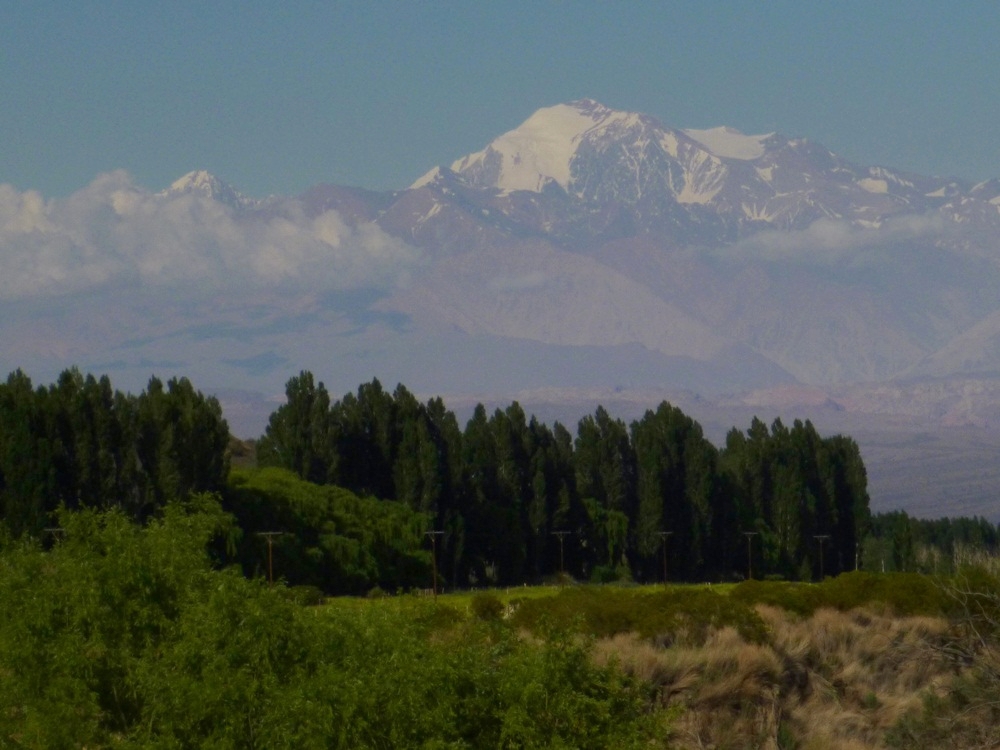
Our cool oasis in the desert: Parque Nacional Leoncito, with views across towards Aconcagua and Mercedario.
Christmas stocking fillers: a bag full of sun-warmed water strung up from a tree means a treat for everyone in sniffing vicinity…
…to bake South African stickbread – a Rhiannon favourite.
Perched above the park, CASLEO Observatory makes the perfect James Bond villain’s lair…
…and stargazing is thwarted – until a magical final night. The sky clears, and we are treated to an unforgettable view of Jupiter and its moons.
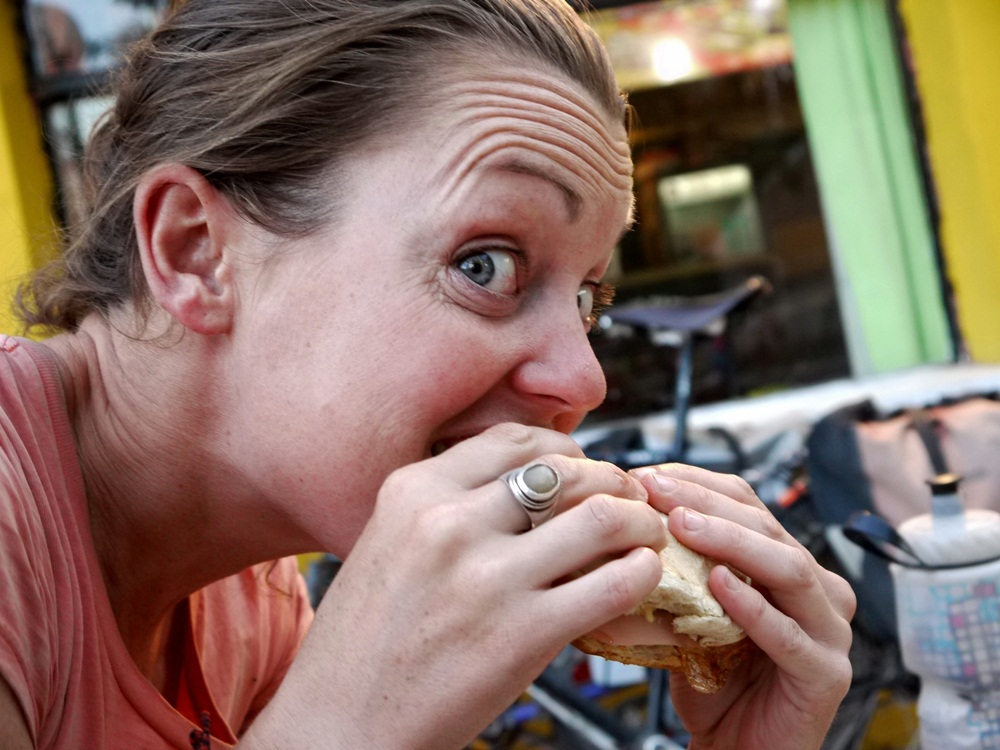
“Eat lomito!” I’ve scribbled on my map above Uspallata – so we do. Thanks Pikes – your one stop shop for peaks, passes…and the best steak sandwich recommendations.
